SPRING | SUMMER 2023
Understanding the preference for natural talent with



Understanding the preference for natural talent with




One of my favorite aspects of the newest phase in the Wisconsin School of Business’ Trusted to Lead brand campaign is seeing the many different possibilities in business. Launched in February, the campaign features two dozen students who are pursuing their passions, values, and purposes as they define their career paths.
As I look over these stories, I am struck by how each student embraces their individual strengths and backgrounds to broaden the scope of what’s possible in business as they break boundaries and ignite change.
Take Charlie Forbes, for example. With an interest in both finance and politics, this fourth-generation Badger is merging his passions to bring a different perspective to Wall Street. You can meet Charlie and some of the other students featured in the campaign on page 28.
As I read the stories included in this magazine, I’m equally excited about the many paths our alumni take into business— including this year’s outstanding 8 to Watch selections. Kelley Kollock (page 15) is improving sustainability efforts at one of the world’s largest hotel chains. Tim
Schlidt (page 21) is raising capital to fund psychedelic therapies, creating a new wave of cutting-edge antidepressants. And Amber Scott (page 18) is using her real estate expertise to create economic opportunity for underrepresented communities.
I am inspired by these stories and seeing how our students and alumni alike are chasing their dreams, redefining success, and doing business differently.
That is, after all, the Wisconsin way. I can’t think of any better way to be.
Sincerely,
Vallabh “Samba” Sambamurthy Albert O. Nicholas Dean Wisconsin School of Business Photo by Paul L. Newby II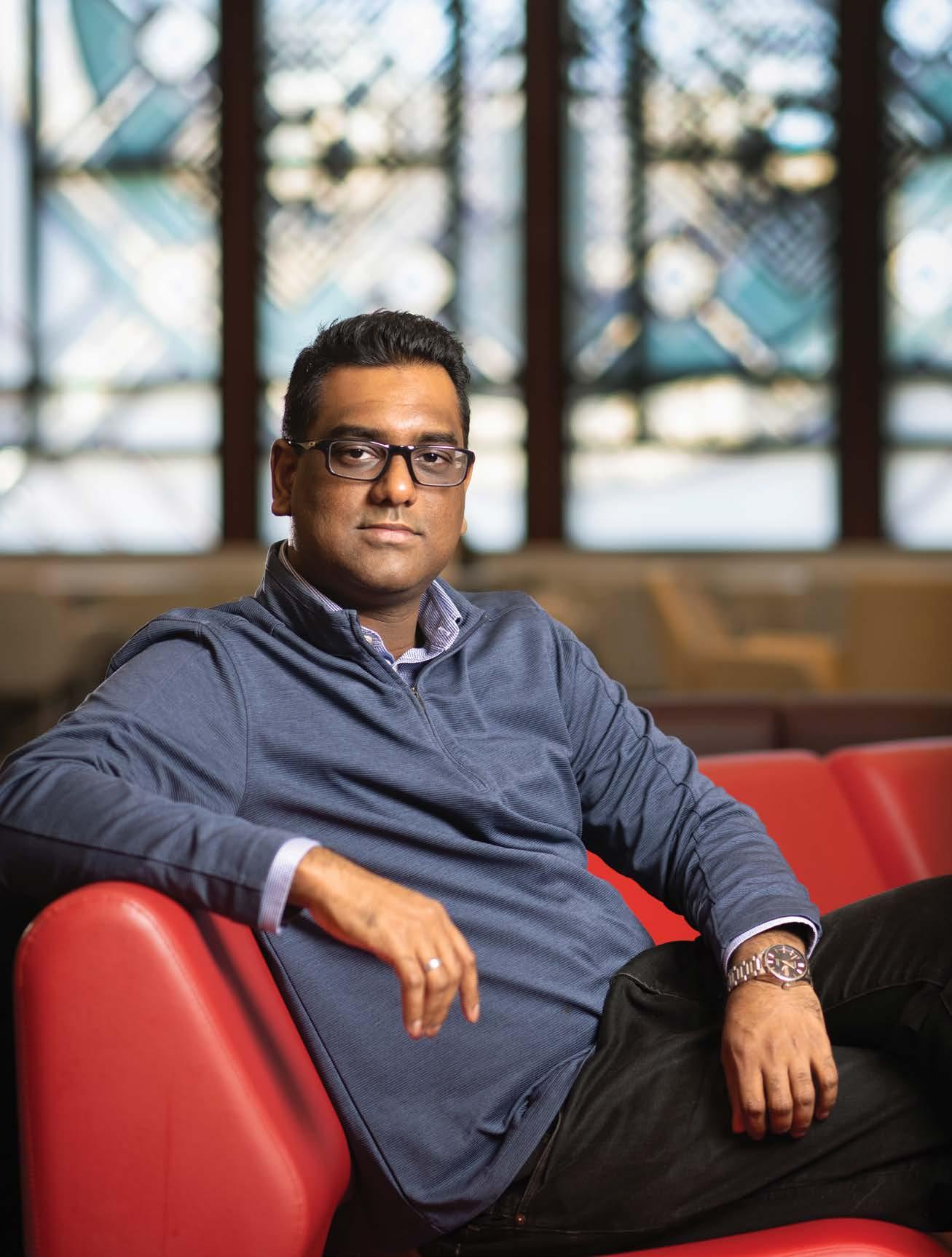
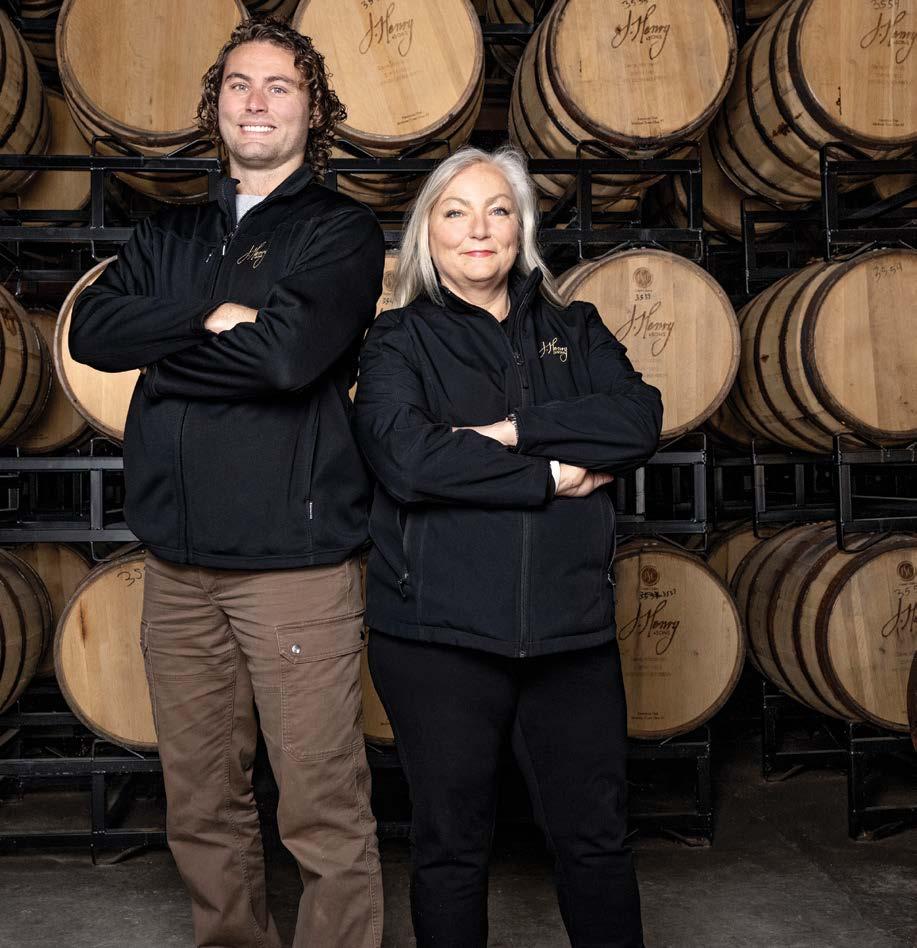
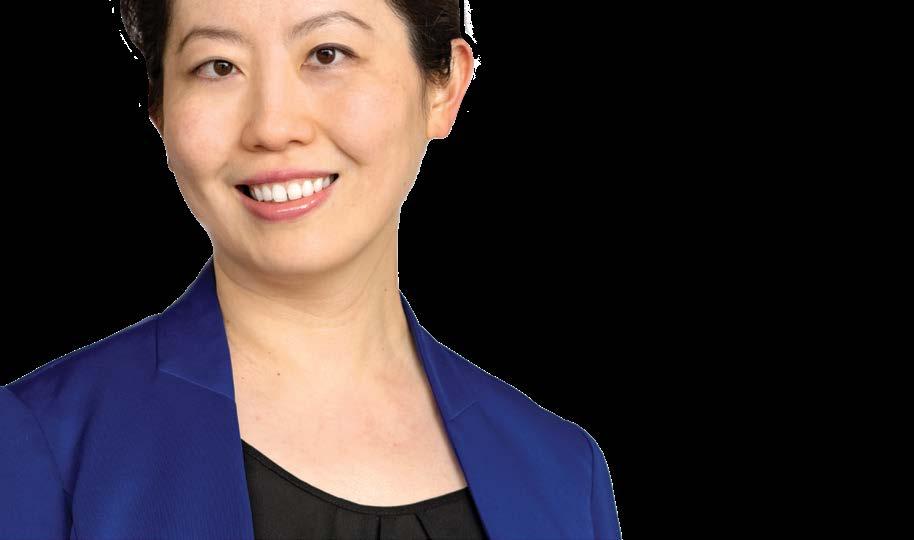

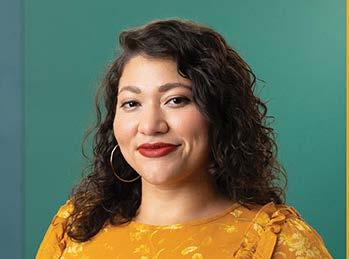
On a busy day, hundreds of students pack the Capital Café in Grainger Hall to load up on coffee, snacks, paninis, breakfast sandwiches, and much more. More than 35 student workers staff the popular eatery, which opened in 1996 and now serves about 200–220 meals per day during the school year.
We asked Robbie Buchanan, Capital Café manager, for a closer look at what’s fueling Business Badgers:
40%
Available daily
Seven sandwiches, three salads, and a variety of other tasty options
325-350
Coffee drinks are sold each day to caffeine-craving customers
Grab and go Prepackaged sandwiches and other items from the café’s self-serve coolers make up nearly half of all meals served
| EDITORIAL | MANAGING EDITOR
Betsy Lundgren (BA ’03, MA ’05)
WRITERS
Chris Malina
Haley Tollison (BA ’20)
| DESIGN & PHOTOGRAPHY | ART DIRECTOR AND DESIGNER
Shaysa Sidebottom Cook
PHOTOGRAPHERS
Daniel Berman
Timothy Devine
Jim Newberry
Paul L. Newby II
| ADVISORS | EDITORIAL
Sandra Bradley (MS ’90)
Kaylene Christnovich
Sirinda Pairin (BA ’15)
Binnu Palta Hill (BA ’97)
BRAND
Katie Schauer
© 2023 Board of Regents of the University of Wisconsin System
Update is published biannually. All rights reserved.
PUBLISHER
Most popular food items include the bacon, egg, and cheddar bagel breakfast sandwich and the chicken pesto sandwich
Wisconsin School of Business Grainger Hall 975 University Avenue
Madison, WI 53706
business.wisc.edu/update
New contender
Matcha drinks are rising in popularity—and sales
Best-selling coffee drinks include caramel macchiatos, cold brew coffee, and flavored lattes (especially vanilla and caramel)
University of Wisconsin–Madison is an equal opportunity and affirmative action educator and employer.
What’s on tap for Harley’s 120th anniversary?
We’re going to have some great acts, but really, our customers are the show. It’s their interaction, it’s their bikes. We have to be open to our customers owning our brand. Riders from all over the world are taking their vacation to come and be with me. How cool is that?
What motivates you on the job?
The museum hosts about 500 events a year, from corporate retreats to weddings. So, I’ve done a lot of things but I haven’t yet done the perfect event. There’s always one more question I could have asked to make an event even a hair better. That’s what pushes me.
Oh, and a few more things:
What is your favorite WSB memory?
Coordinating Madison’s Art Fair on the Square as an MBA student was amazing. It changed my life and got me hooked on events. It also taught me that it’s not about planning every little detail—it’s about building systems so strong that they don’t break when the chaos hits, which really is the fun part.
Bradway built early business chops by operating his family’s bowling alleys in Michigan’s Upper Peninsula. | 20: The age when he bought his first motorcycle. | Another of Bradway’s favorite jobs was working the drive-thru at A&W. “I loved the owners and the culture.” | Event philosophy: Organize, but embrace the unpredictability. “If something is overplanned, over-curated, or overly easy, it’s not memorable.”


To read more, visit business.wisc.edu/news
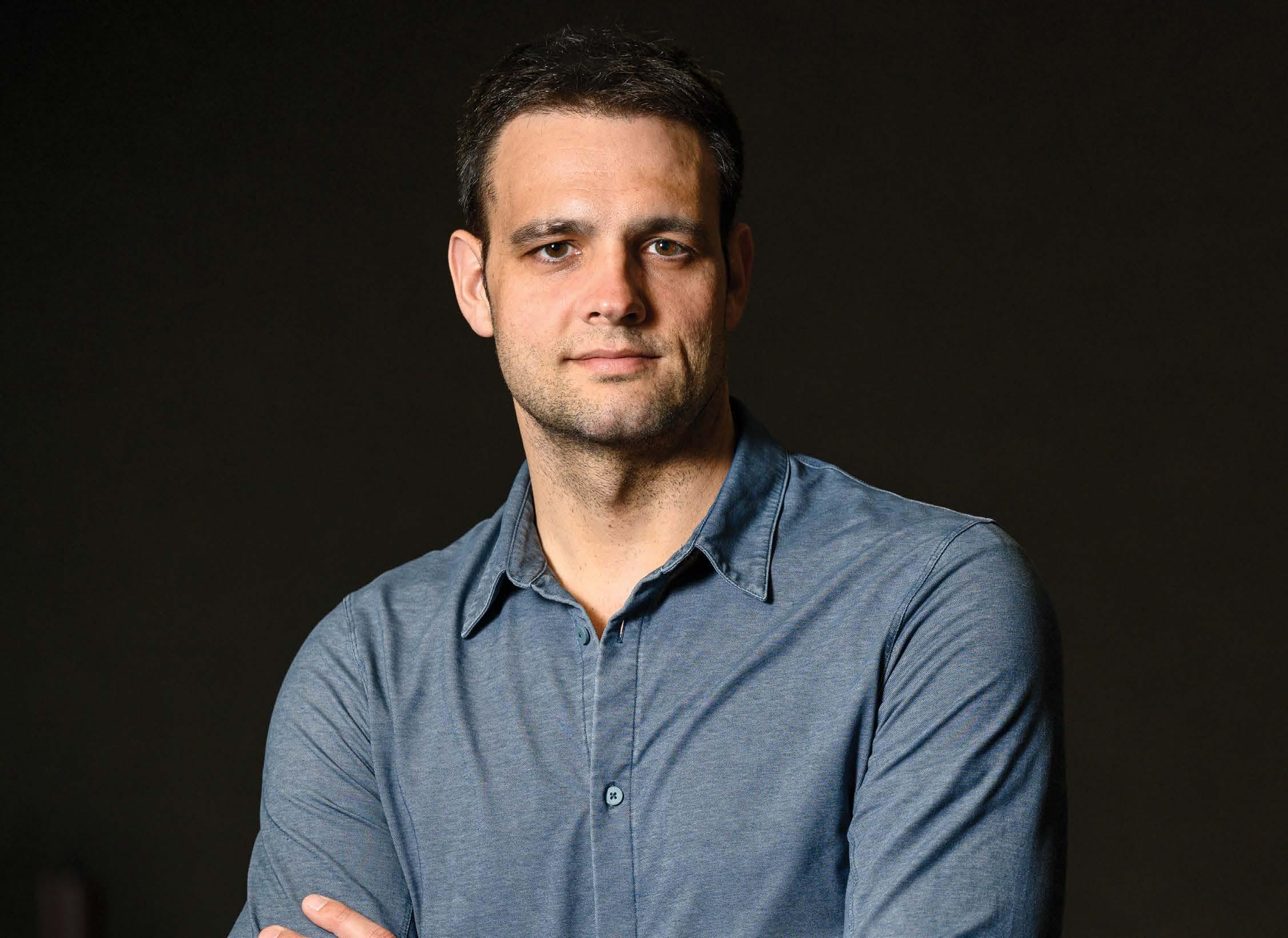
In Fall 2023, WSB’s international business major will transition to a certificate program, enabling more students to integrate international business into their academic plans. The international business major had previously required a double major, making it
difficult for some students to fit this area of study into their degree plans.
“We are excited that more Business Badgers will have the opportunity to explore international business through the flexibility this new certificate offers,” says
Sachin Tuli (BBA ’98, MS ’00), director of the international business program. “Research shows that those who advance their global mindset are more inclusive and empathetic, have greater self-confidence and comfort with ambiguity, and are
more imaginative in solving problems and forging cooperation.”
Students who are currently pursuing the international business major have the option to switch to the certificate program in Fall 2023 or complete their major by Summer 2028.
WSB’s world-class business education gives students the strong academic foundation and real-world skills to launch impressive careers upon graduation. Undergraduate students from the Class of 2022 set a new benchmark for post-graduate success, as highlighted by the data below:
95% 60+ +$7,000
Among undergraduates within three months of graduation—an all-time high
Secured by undergraduates, reinforcing WSB’s investment in this growing field
job placement jobs in consulting average starting salary increase
Since last year, reflecting heightened demand and value of WSB graduates
Steady growth of student enrollment is an important measure of an academic major’s success and relevance. WSB’s supply chain management major ranked #8 on UW–Madison’s hottest majors list, which highlights undergraduate majors that added the most students from Fall 2018 to Fall 2022. “We deliver an exceptional learning experience to our students,” says

Jake Dean (MBA ’09), director of the Grainger Center for Supply Chain Management. “I believe the resources provided by WSB and the Grainger Center for Supply Chain Management and the increasing renown of supply chain as a discipline and career are among the primary reasons why we have had so much growth.”
Alumni, parents, and friends came together on March 28–29 for UW–Madison’s annual day of giving: Day of the Badger. Thanks to the strong Business Badger community, more than $152,000 was raised for the Wisconsin School of Business. These gifts will be used to increase access to global experiences for current and future students, allowing them to see business through a global lens and build key problem-solving skills, resiliency, and cultural awareness. More than 300 donors helped unlock a generous $50,000 match from Anthony and Carolyn McCusker. WSB is grateful for everyone who participated in this year’s campaign and is excited to increase global learning opportunities for the next generation of business leaders. For the first time, WSB also hosted a Day of the Badger student celebration to educate students on the importance of philanthropy and celebrate the gifts that enhance their educational journeys. ◀

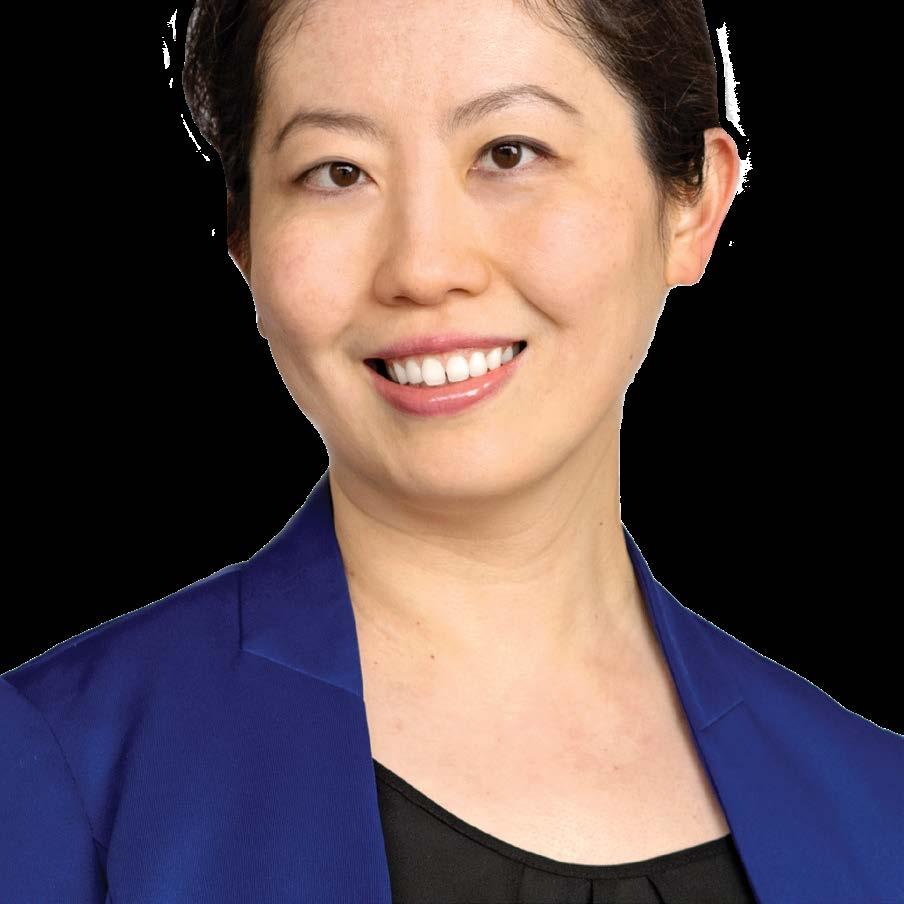 BY CHRIS MALINA | PHOTO BY PAUL L. NEWBY II
BY CHRIS MALINA | PHOTO BY PAUL L. NEWBY II
From a young age, pianist Chia-Jung Tsay wondered why her fellow musicians were going to such great lengths to conceal their warm-ups before big performances and competitions.
“The practice room windows were often covered with newspaper,” says Tsay, who holds graduate degrees in music performance and a PhD in organizational behavior and social
psychology. “If there was a hook on the windowed door, people would hang clothing or even folding chairs to block the view.”
That behavior was a clue that judges and audiences might actually prefer the naturally gifted performers— the ones who didn’t need the hours of practice before concerts—and it’s something Tsay would later investigate as a social scientist.
Now, as an associate
professor of management and human resources at the Wisconsin School of Business, she’s further exploring the psychological processes that influence decision making about performance—including the so-called “naturalness
choices seem to reveal this preference for the naturally gifted instead.”
To illustrate that discrepancy, Tsay first conducted a study in which participants were presented with biographies of two classical musicians: one
who was described as a natural to some participants and a hard worker to others— and similar results ensued.
“On average, people would see the business proposition attributed to the natural as more likely to succeed,” says Tsay. “They were also more willing to invest in that idea.”
While Tsay points out that there’s nothing wrong with appreciating natural talent, she says it’s important to understand the contradiction illustrated by the research and the consequences it can have—especially in human resources, where things like hiring decisions can be subtly influenced by unconscious biases.
she says. “Once there is that awareness, we can potentially create the conditions where we’re less vulnerable to the factors that we wouldn’t consciously say should affect our judgment.” ◀
bias”—and how it plays out in business.
Bringing this preference for naturals to the surface, however, takes work, especially when people frequently claim to prefer the strivers. Qualities like grit, tenacity, and hard work tend to be seen as valuable, and after all, who doesn’t love an underdog story?
“However, there’s a distinct difference between what people explicitly say is important and valuable to an area of achievement and what they do,” says Tsay, who joined WSB in 2021 as the Bruce and Janice Ellig Professor in Management. “People indicate they very much favor hard work and striving, but their
described as a naturallygifted pianist and another as someone who honed her skills over the years. Participants were then asked to listen to clips of each before evaluating both musicians on a variety of factors.
The results came back with an overwhelming preference for the natural’s performance—even though both clips of music actually came from the same performer.
Later, Tsay investigated the implications of her previous findings in a very different industry and tested perceptions of entrepreneurs. Participants were asked to listen to the same startup pitch, delivered by a speaker
“It’s not just about fairness to candidates, which is important, but there could also be an impact on organizations as well,” she says. “Without realizing it, hiring managers are potentially losing out on people who may be more qualified on the metrics that an organization cares about.”
Going forward, Tsay continues to conduct studies aimed at further understanding and unpacking naturalness bias. Since first exploring the topic more than 10 years ago, new avenues of research have opened up— especially when it comes to equity and inclusion.
“I’m continuing to use this lens to think about less conscious influences on perceptions of performance or perceptions of achievement to look at the implications for different genders and racial minorities,”
‘Talent’ and ‘skill’ are frequently used interchangeably to describe ability in the workplace, but according to one of Tsay’s recent studies, there’s good reason to use more caution in the choice of terminology when referring to employee development.
That’s because the word talent may imply that you either have it or you don’t. Skill, however, is more frequently associated with elements of growth or improvement. It might sound like semantics, but Tsay says it can have a real impact on organizational decision making.
“When asked to improve talent—rather than develop skills—in an organization, leaders may be less likely to devote resources to their own employee development. We might become more pessimistic if we think people can’t change.”
“People indicate they very much favor hard work and striving, but their choices seem to reveal this preference for the naturally gifted instead.”
CHIA-JUNG TSAYBY CHRIS MALINA
The mother and son—both Business Badgers—are two of the powerhouses behind Henry Farms, LLC, based in Dane, Wisconsin. Those working in agriculture may know the Henrys best for their seed corn operation, but those who enjoy a good cocktail are most likely familiar with their
secondary business: J. Henry & Sons, which crafts small batch bourbon and has taken on a life of its own in recent years.

“When we started, we were producing only a couple hundred barrels each year,” says Joe. “Now, we have three rickhouses with capacity for more than 10,000 barrels on the property, and that’s just to keep up with our current demand.”
Continued on page 10

Liz and Joe Henry are building a family enterprise, one bottle at a time
PHOTOS BY PAUL L. NEWBY II
For Liz Henry (BS ’83, MBA ’96) and Joe Henry (BBA ’14), being in business together isn’t just a job. It’s a family matter.
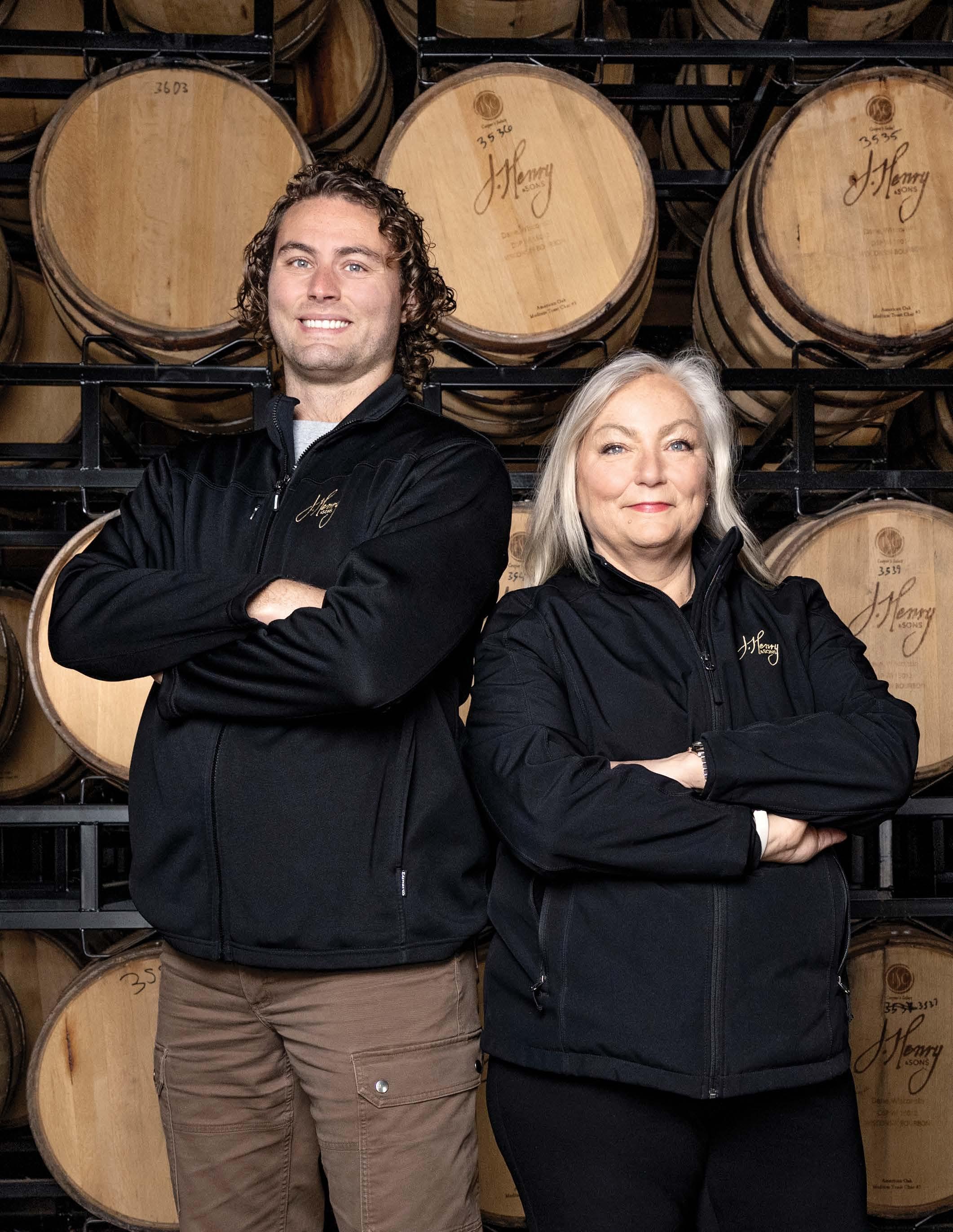
One might chalk that success up to a variety of factors: quality ingredients, an overall rise in popularity of craft spirits, and just good old-fashioned business savvy.
But ask the Henrys what’s behind their success and they’ll tell you that when your name is on the bottle, you tend to do things differently.
When Liz married her husband, Joe Sr., and began working on the farm that’s been in the Henry family since 1946, she knew farming was changing and saw a business degree as the perfect complement to her own experience and undergraduate degree in agriculture.
“One of the key components I felt was going to make family farms successful as they moved to the new generation was having business acumen,” she says. “You need to understand not just the basics of balance sheets and income statements, but also human resources, marketing, merchandising, and how to negotiate with vendors.”
Little did she know upon receiving her MBA that she’d soon be putting that education to work selling a spirit that she wasn’t even sure she had a taste for.
“My husband and I were vodka drinkers,” she says with a laugh, but a trip to Kentucky’s famed Bourbon Trail in the mid-2000s planted the very serious seed for a new business in Joe Sr.’s head. After some trial and error, the Henrys—including sons Joe and Jack—began making bourbon in 2009, using grains from their own farm.
A good bourbon, however, takes its sweet time getting ready, and the Henrys’ first bottles didn’t hit the market until 2015. It was an excruciating wait for an untested
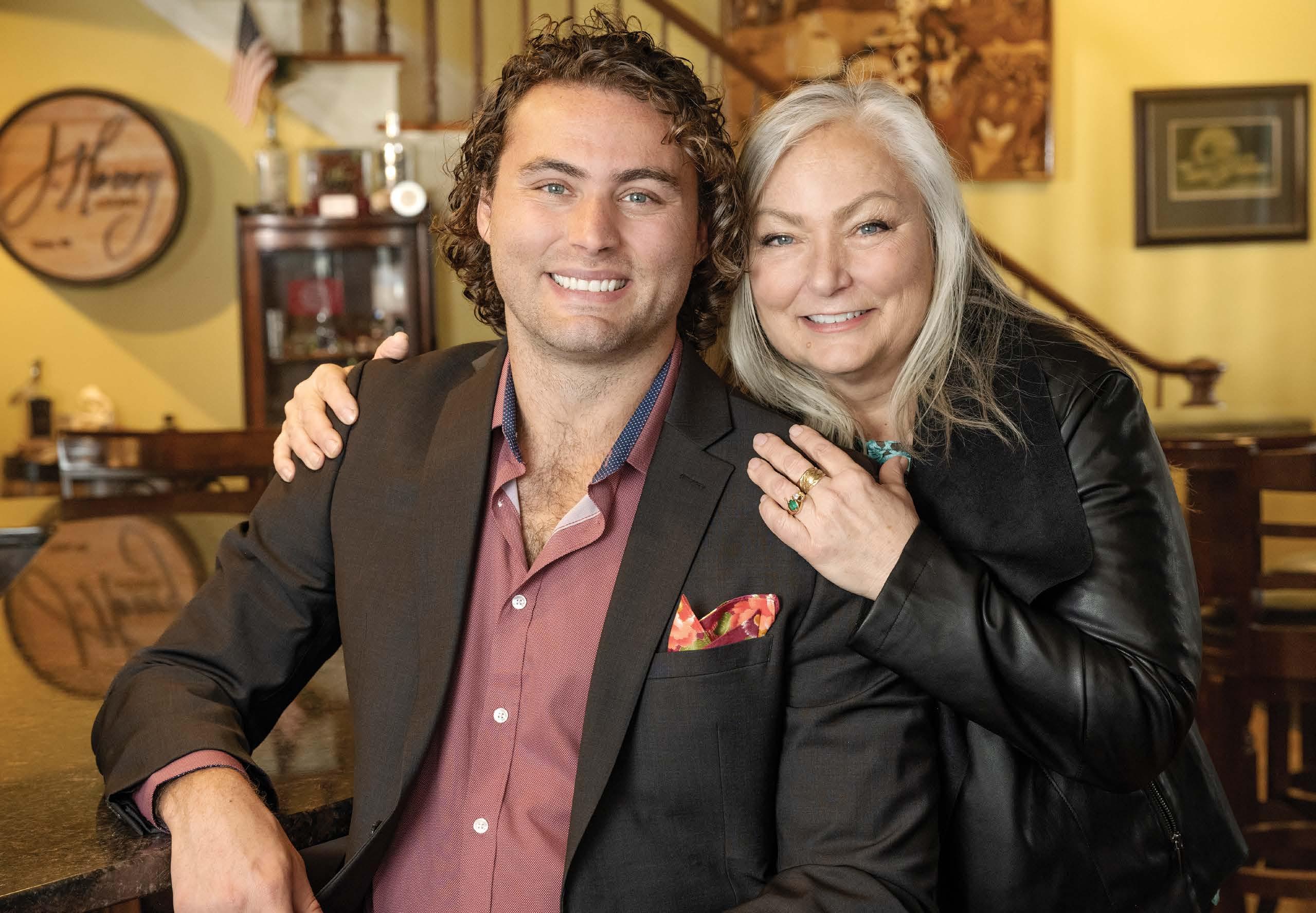
“I’m very proud of the fact that this brand is really us.”
LIZ HENRY (BS ’83, MBA ’96)The family welcomes visitors to their historic farmhouse turned tasting room.
product, but the Henrys got a big boost in confidence after entering their first spirits competition in Louisville, Kentucky.
“We didn’t even have a label for it yet,” says Joe. “The bottle had our name on a piece of masking tape. And it still won an award.”
That award was a coveted gold medal from the American Distilling Institute and an affirmation the family was on to something, both professionally and personally.
“I never really saw myself being a farmer, and I think another reason my dad started making bourbon was to wrangle my brother and I back into the family business,” says Joe, who moved to Chicago and started a career in sales after studying management, HR, and international business at WSB. Having grown up on the farm, Joe admits to initially wanting some distance from his family’s
Did you know?
Bourbon must have a mash bill— or mix of grains used to make the spirit—of at least 51% corn.


operation, but ultimately came home in 2018 to take on a larger role with the business.
“I realized we have a story that nobody else can hold a candle to,” he says. “To have full-sized barrels of bourbon, made with four grains growing right out here on our farm, distilled and aged in Wisconsin for over four years—they’re all huge selling points. I really wanted to see how far we could go with this brand.”
With Joe and Liz working side-byside, growth has been the story of J. Henry & Sons in recent years. In addition to offering tours and tastings, the family has invested in new bottling equipment, released limited-edition bourbons, won additional gold medals, and partnered with local chefs to host dinners and pairings on the farm and in the market—all while still operating a successful seed corn operation.
“We’re trying to grow in a way that doesn’t make us crazy or put us on the sale lot in another year or two,” says Liz. “Joe and I each have different skill sets. That’s really helped us grow organically.”
And as the number of barrels increases and the brand spreads beyond Wisconsin, Liz and Joe are both committed to keeping the business’ close-knit, family feel going strong. Because even on the challenging days—and there are challenging days—the Henrys agree that family is the reason for the business’ success, which is something worth raising a glass.
“I’m very proud of the fact that this brand is really us,” says Liz. “It’s my husband, our sons, our family, but it’s also the steps that we take to make sure it’s a premium product. That authenticity is what elevates and motivates us every day.” ◀
When Jerry Henry—the original J. Henry and Joe’s paternal grandfather—bought his farm nearly 80 years ago, he began growing an heirloom breed of red corn developed at UW–Madison in 1939 called W335A .
While heirloom corn breeds were popular for decades, many farmers ultimately turned to geneticallymodified varieties to maximize their yield—and profits—which caused W335A to disappear from farms and nearly go extinct.
However, when it came time to choose the right corn to make J. Henry bourbon, the family was able to rekindle an old flame. Thanks to a seed bank at UW–Madison, they were able to obtain the W335A kernels to repopulate the crop on the family farm.
“We’re the only people in the world using that variety of red corn,” says Liz. “It really lends a unique flavor profile to the bourbon.”
As the Wisconsin School of Business’ first-ever embedded mental health provider, Julie Phillips is quickly proving to be a welcome resource to students, faculty, and staff. As a complement to WSB’s existing student success team, which provides holistic support to Business Badgers both inside and outside the classroom, Phillips offers counseling and other clinical therapeutic services aimed at helping students prioritize their mental health and wellbeing.
A licensed marriage and family therapist with nearly 30 years of experience in counseling and higher education, Phillips—who joined WSB in November 2022—also holds an MBA and is uniquely positioned to understand the challenges and stressors facing business students and give them the tools to achieve professional success while maintaining a healthy mindset.

WSB: Why is it important to have this position here?
Julie Phillips: As an embedded mental health provider, you’re actually part of the community you’re supporting, rather than being an outside entity. I think that’s definitely an advantage, in that students see an office within their building. It’s faster and easier for them to access these services because I’m right there in Grainger Hall and I’m only seeing students from the Wisconsin School of Business. It’s more convenient for them and they feel more comfortable. I also think that helps a lot in terms of reducing the stigma of seeking out mental health support.
Another advantage of being embedded is that I have a better understanding of the school’s culture. I’m familiar with the instructors that students have, I know the policies and the timelines surrounding internship applications, and I understand the common stressors and elements that really play into that. So, students don’t have to go over all that in order for me to understand where they’re coming from.
WSB: What services do you offer?
JP: I primarily provide direct counseling services
to undergraduate students at WSB, and those appointments can be either virtual or in-person depending on comfort levels and schedules. I also provide four hours of “Let’s Talk” sessions each week, which are open to all students from preadmission to graduate. During these sessions— which are less formal than individual counseling— students can drop in and
WSB: How else are you supporting wellbeing across the school?
JP: I’m available on a consultative basis for faculty, staff, and instructors who might benefit from hearing about something through a mental health lens. Since joining WSB last year, I’ve been doing meet and greets so that everyone within the school
provide helpful tips on practices like self-care.
WSB: What’s stood out after your first few months on the job?
JP: I’ve been very impressed with the student population, in terms of their willingness to consider and participate in the therapy process. From what I’ve experienced, students are not hesitant to directly reach out for services or individual counseling. That’s a shift we’ve seen since the pandemic, and I think that’s encouraging.
talk about whatever they wish. They don’t have to make an appointment and there’s no paperwork. As a result, some students might use that as a bridge or gateway to more routine outreach programming and counseling.
We also have a myriad of services available through University Health Services, from support groups to a 24/7 crisis line, should a student need further resources.
becomes familiar with me and feels comfortable referring students my way. Many instructors are now including my contact information and a description of my services within their syllabi, which is really helpful. I also put on workshops for staff and faculty where I’m able to help manage some of their concerns about students— such as how to identify the signs of depression—or
In addition, having WSB administration really support and advocate for this position—as well as clearly see its function in ensuring student success— has gone a long way in further destigmatizing mental health services. For students, seeing that the school is committed to their mental health is a very welcome development.
I’ve also just found WSB to be so welcoming and accommodating, and it’s really a joy to be here. ◀
Interview conducted and edited by Chris
Malina“For students, seeing that the school is committed to their mental health is a very welcome development.”
JULIE PHILLIPS
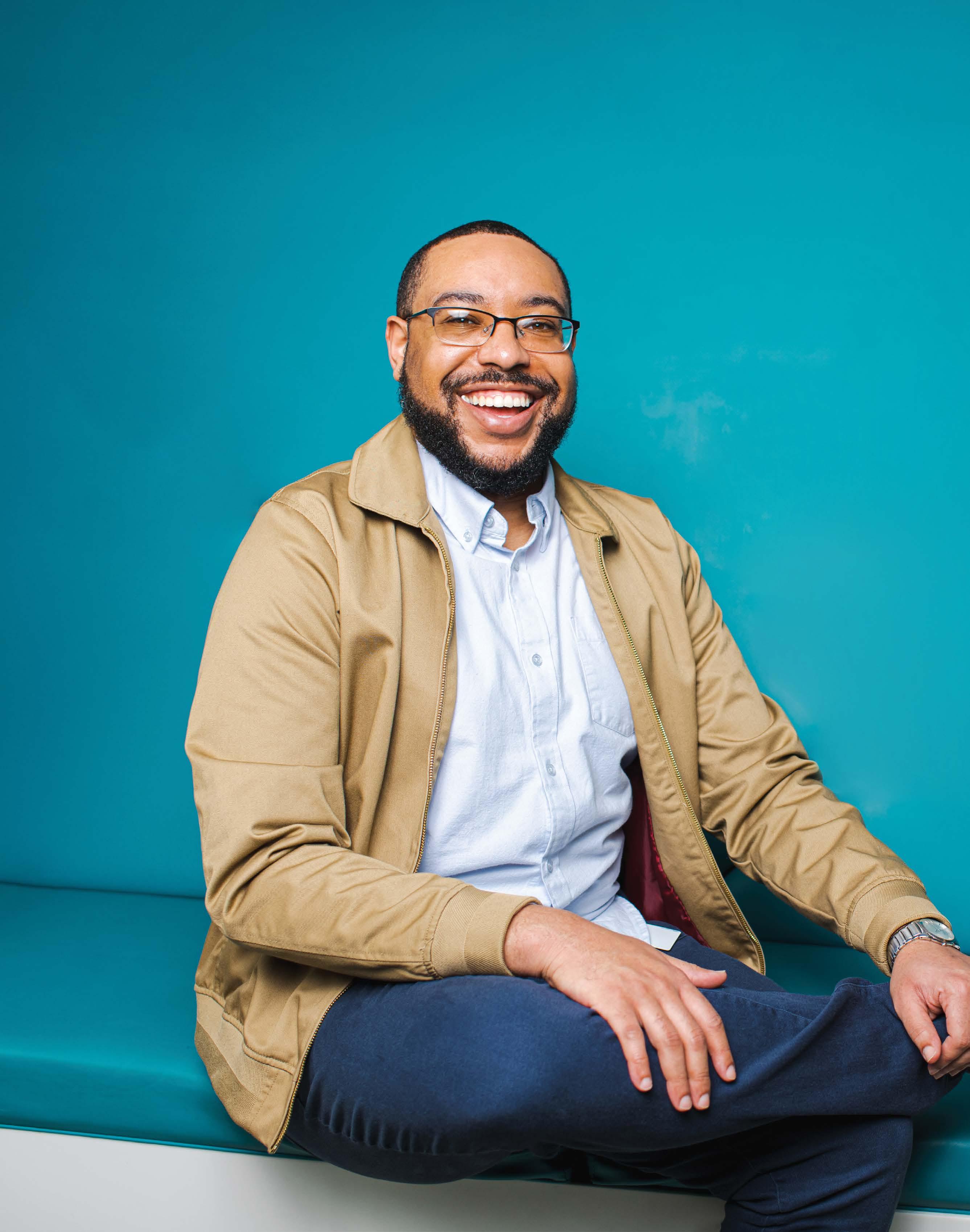
Location: Seattle
Previous jobs: Talent engagement and development manager, compensation manager, diversity champion team lead, and other HR roles, Nielsen

Why he’s among the 8 to Watch: Malloy puts people at the center of everything. His inclusive and systematic approach to human resources at Microsoft helps ensure a harmonious balance between individual and corporate needs. “We all have to pitch in to be able to make a business successful,” he says. “If we can do that in a way that honors who we are individually and then what we can do collectively, that’s how we succeed.”
A strong foundation: Growing up in Los Angeles, Malloy says attending college in Wisconsin wasn’t exactly on his radar—but receiving a prestigious Posse Foundation scholarship allowed him to enroll at UW–Madison and study consumer science. He later was accepted into the Human Resources Emerging Leaders Program at Nielsen where he began his HR career in full. There, Malloy traveled to Shanghai, China, to create and deploy a new career development framework for employees. Impact of a WSB degree: Engaging in classroom discussions with other working professionals about real-life situations and challenges during his evening MBA program was invaluable preparation for a high-level career in HR. Matching with Microsoft: Malloy was hired at Microsoft in 2019, moved to Seattle, and got to work building and establishing systems to foster deeper connections among the company’s many teams—something that took on added importance during the COVID-19 pandemic. Building a pipeline: Being able to recruit more diverse talent into HR has driven Malloy throughout his career because he sees room to create long-lasting change. “As we develop the next generation of business leaders, we have to think about our processes differently. HR is a great home base for that work because we can be a representation of what we need to see within a broader business.”
Location: Arlington, Virginia
Previous jobs: Various roles in planning, product design, inventory, and pipeline management, Target
Why she’s among the 8 to Watch: A leader in the emerging field of environmental, social, and governance (ESG), Kollock shapes initiatives for sustainable travel and increased corporate responsibility for one of the world’s largest hotel chains. Since joining the company in 2022, Kollock and her team helped land Hilton on the Dow Jones Sustainability Indices—a benchmark for corporate sustainability efforts—for the sixth straight year.
From red to green: At WSB, Kollock majored in marketing and supply chain management before accepting her first job with Target. There, she worked alongside a design team incorporating circular economy principles into their work—and extending the life of everyday products— which further developed her interest in sustainability and pushed her to explore careers in the ESG field.
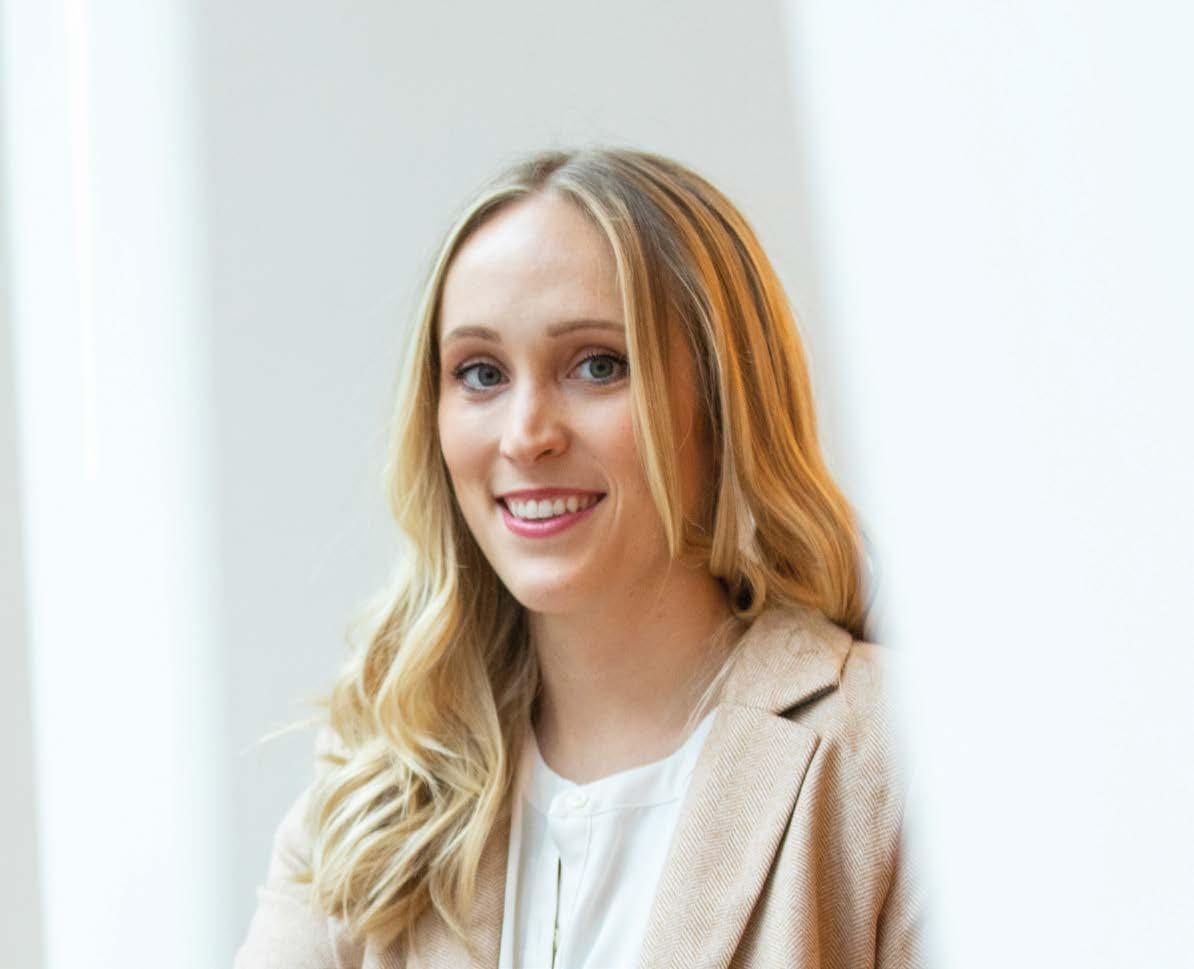
Impact of a WSB degree: With over 7,000 hotels in Hilton’s portfolio, Kollock has her hands full when it comes to incorporating sustainability strategies at diverse properties around the world. Fortunately, her education has given her a leg up in logistics. “I would encourage anybody to take a supply chain management course. It helps you see the whole picture. You are really only one piece in what’s often a bigger puzzle, and it’s helpful to have that mindset when looking at challenging scenarios.”
Best advice for students: Kollock never expected to spend her final spring break as a WSB student in Germany studying the country’s auto industry—but she couldn’t pass up the chance to travel and get practical, hands-on experience. “If somebody’s offering you an opportunity for something, take advantage of it. Even if it doesn’t immediately sound like your thing, it’s oftentimes worth it.”
Photo by Timothy DevineLocation: Madison
Previous jobs: Managing partner, Multihyphenate Productions; chief of staff to CEO, seed-stage startup; theater literary assistant, ICM Partners; various other roles in the performing arts industry
Why she’s among the 8 to Watch: Through her work with the American Family Insurance Institute for Corporate and Social Impact, Porter facilitates investments in companies aimed at closing equity gaps in America with a specific focus on economic opportunity and healthy youth development. She embodies the company’s philosophy of dreaming fearlessly and is committed to enacting social change.
Lights, camera, action: As a theater major who paid her dues in the entertainment industry before pursuing an MBA in arts administration, Porter initially had her sights set on landing a managing director job with an arts organization. While at WSB, she quickly became a leader in diversity, equity, and inclusion work, and soon realized she could leverage her experience and business education to directly impact causes that were important to her. Redefining what’s possible: When American Family Insurance launched the institute, the company reached out to WSB looking
for interns—and ended up finding a perfect match in Porter. She admits her path into venture capital wasn’t exactly traditional, but says that’s a good thing. “I’m really proud that I was able to break into this work and have the chance to set a new narrative about the kind of person who can do VC.”
Investment in action: Porter and the institute recently backed a company called CNote, which helps large companies move capital into underserved communities at scale.
Impact of a WSB degree: “I leverage everything I learned in the MBA program on a daily basis.”
Giving back: A recipient of scholarships for both her undergraduate and graduate education, Porter says she feels a duty to pay it forward. She’s an active mentor of interns and maintains her connection to the arts by serving on the board of Madison’s Forward Theater Company.

“I’m really proud that I was able to break into this work.”
AMBER H. H. PORTER (MBA’19) Photo by Paul L. Newby II
Location: Madison

Previous jobs: Founder and CEO, Foodcliff; private equity associate, Borgman Capital; senior consultant, Deloitte; associate, Wisconsin Investment Partners
Why he’s among the 8 to Watch: While earning his MBA, Remesan launched his own private equity firm, Madison Lake Capital, and immediately hit the ground running. Within a month of his WSB graduation, the firm closed on its first acquisition. With a focus on lower- to middle-market companies—especially those in Wisconsin—his philosophy is to partner with company leaders to ensure mutual growth and prosperity.

From founder to finance: After earning an undergraduate degree in engineering and later working as a consultant, Remesan launched a mobile food ordering startup, Foodcliff, and found himself drawn to the financial aspects of running a business. That later spurred his decision to move on

from Foodcliff and pursue an MBA in corporate finance and investment banking. Remesan chose WSB because of the solid curriculum and expert faculty.
A different approach: As opposed to turnaround firms, Madison Lake Capital specializes in buying stable companies who are looking to sell—and their collaborative approach has resonated with clients. “We talk to the seller and emphasize that we’ll take care of their people,” Remesan says. “We also take pride in partnering with the management team when we come in to ensure everyone gets a say in company strategy.” Impact of a WSB degree: Remesan credits his professors for listening to his vision for Madison Lake Capital and guiding him along the way—even outside of the classroom. “They truly wanted me to be successful,” he says. “That helped build my confidence and created the sense that I had people I could always call with questions.”
Location: Newport Beach, California

Previous jobs: Various underwriting and market associate roles, Northwestern Mutual; project manager, Community HousingWorks
Why she’s among the 8 to Watch: With more than $10 billion of direct transactional experience across asset classes, Scott is an experienced leader in real estate. In addition to balancing debt and equity investments at Northwestern Mutual, she helped the company launch a new impact investing fund in 2021 aimed at building capital and creating economic opportunities in predominantly Black communities in the Milwaukee area and beyond. “That work has huge potential to impact the trajectory of families and individuals for generations,” she says.
A voice for change: As a first-generation college and postgraduate student from California, Scott studied economics and quickly became inspired by real estate’s potential to create generational wealth. Having grown up in a community where many residents faced financial insecurity—and were frequently excluded from economic policy discussions—Scott saw a career

in real estate as a way of building stability not only for herself, but for those who don’t have a seat at the table.
Impact of a WSB degree: With a nudge from some supportive colleagues, Scott decided to pursue an MBA with a specialization in real estate and urban land economics at WSB. In addition to the specialized curriculum in real estate, she says the best education she received was in the business of people and how to best work alongside others from various backgrounds to achieve mutual goals.
Homeward bound: Scott joined Northwestern Mutual in 2014 and worked in the company’s Milwaukee headquarters before transferring to a field office back in California about an hour from where she grew up. “Having the opportunity to apply my institutional real estate expertise to the cities and communities that I was really familiar with was super exciting,” she says. Best advice: “Be courageous enough to move forward despite your fear. You are more than enough, so create the spaces you need to show up as your true authentic self.”
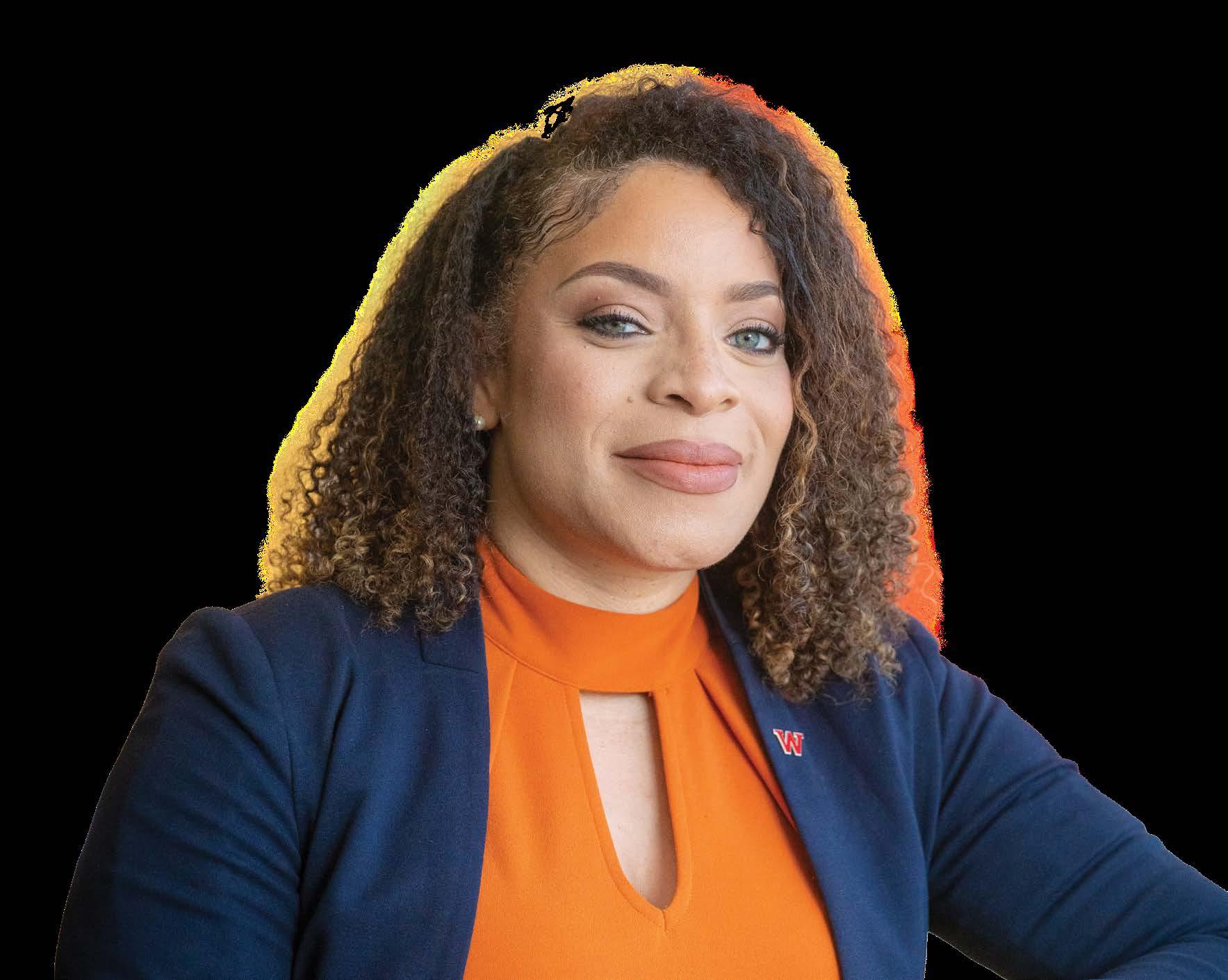
Location: Madison
Previous jobs: Executive director, First Tee South Central Wisconsin; cello teacher/performer; professional golfer
Why he’s among the 8 to Watch: When the pandemic turned the performing arts industry upside down, Loehnis pulled out all the stops to keep the Wisconsin Chamber Orchestra (WCO) in front of audiences and relevant to the community. He’s delivering a new brand of leadership to a new era, introducing creative ways to deliver artistic experiences that entertain, inspire, and unite a growing and diverse modern audience.
The show must go on: WCO is best known for Concerts on the Square, a summer concert series that brings 250,000 people to downtown Madison. When COVID-19 hit, Loehnis knew that canceling wasn’t an option. With a venue change and some strategic reorganization, Loehnis was able to continue Madison’s beloved tradition, making WCO one of the first orchestras in the country to safely perform during the pandemic.
Musical beginnings: Loehnis picked up his first cello in third grade and was playing for the Green Bay Symphony by the time he was 16. Since then, he has been using his talent to inspire youth
in his community. At one point, Loehnis was teaching cello to 25 students—while simultaneously golfing on professional tours. “I saw the impact that music had on me, and I had the opportunity to give that same impact to kids and watch them develop as people,” he says. “I got to see it come full circle.”
Impact of a WSB degree: Loehnis’ role as an executive requires him to juggle many different responsibilities—a skill he honed at WSB. “On any given day, I could be doing finance, human resources, or operations. Without even realizing it, I’m drawing from those WSB classes every day.”
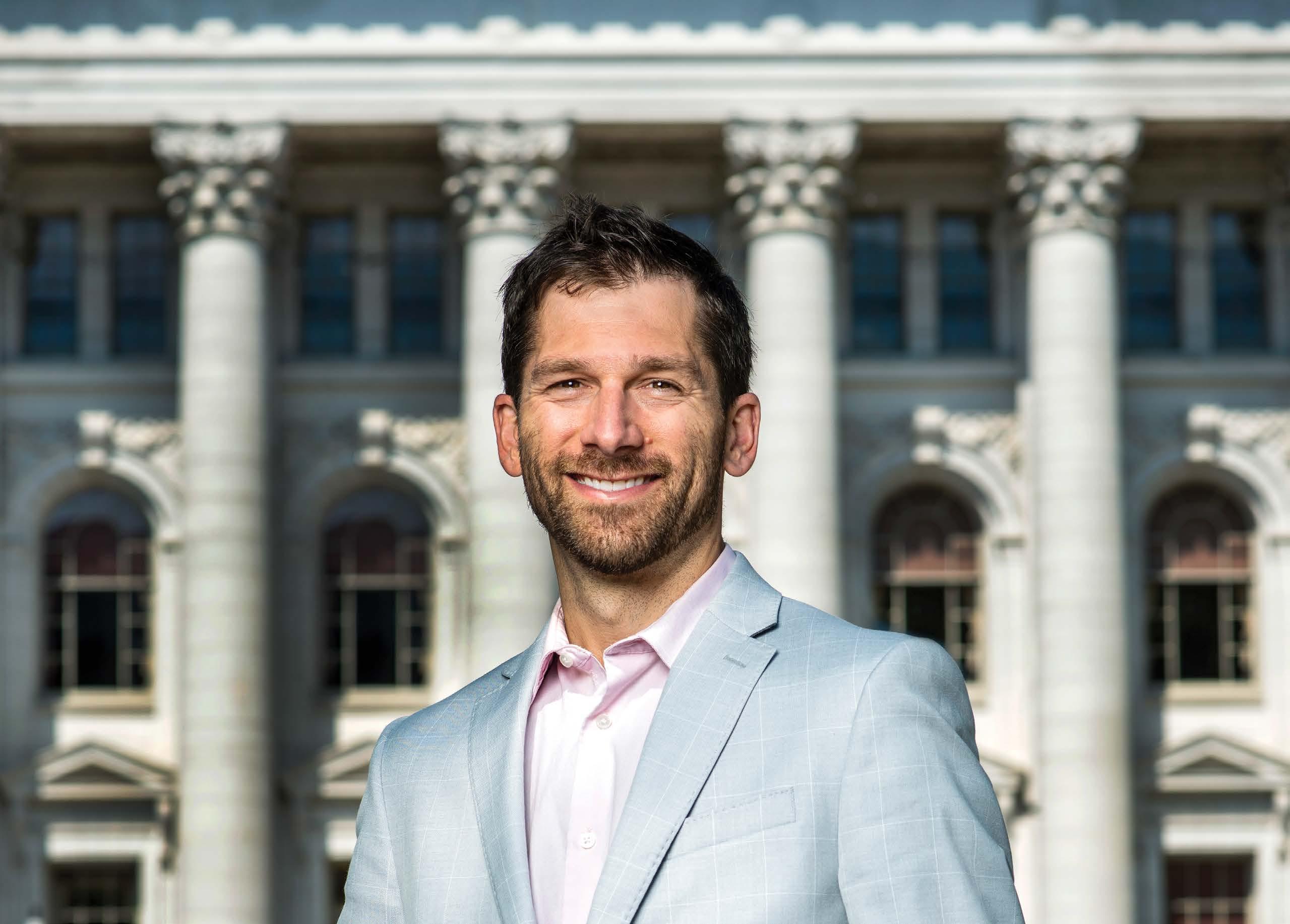
“I saw the impact that music had on me, and I had the opportunity to give that same impact to kids and watch them develop as people. ”
JOE LOEHNIS (MBA ’18)
Location: Portland, Oregon
Previous jobs: NCAA licensed merchandise manager, Adidas; senior merchandising analyst and various other roles, Wilson Sporting Goods Company
Why she’s among the 8 to Watch: Driven by a personal and professional passion for sports, Johnson creates lasting impact in industry and the community. Her desire to create new opportunities has earned her high-profile positions at both Wilson and Adidas and led her to create her own youthfocused foundation.
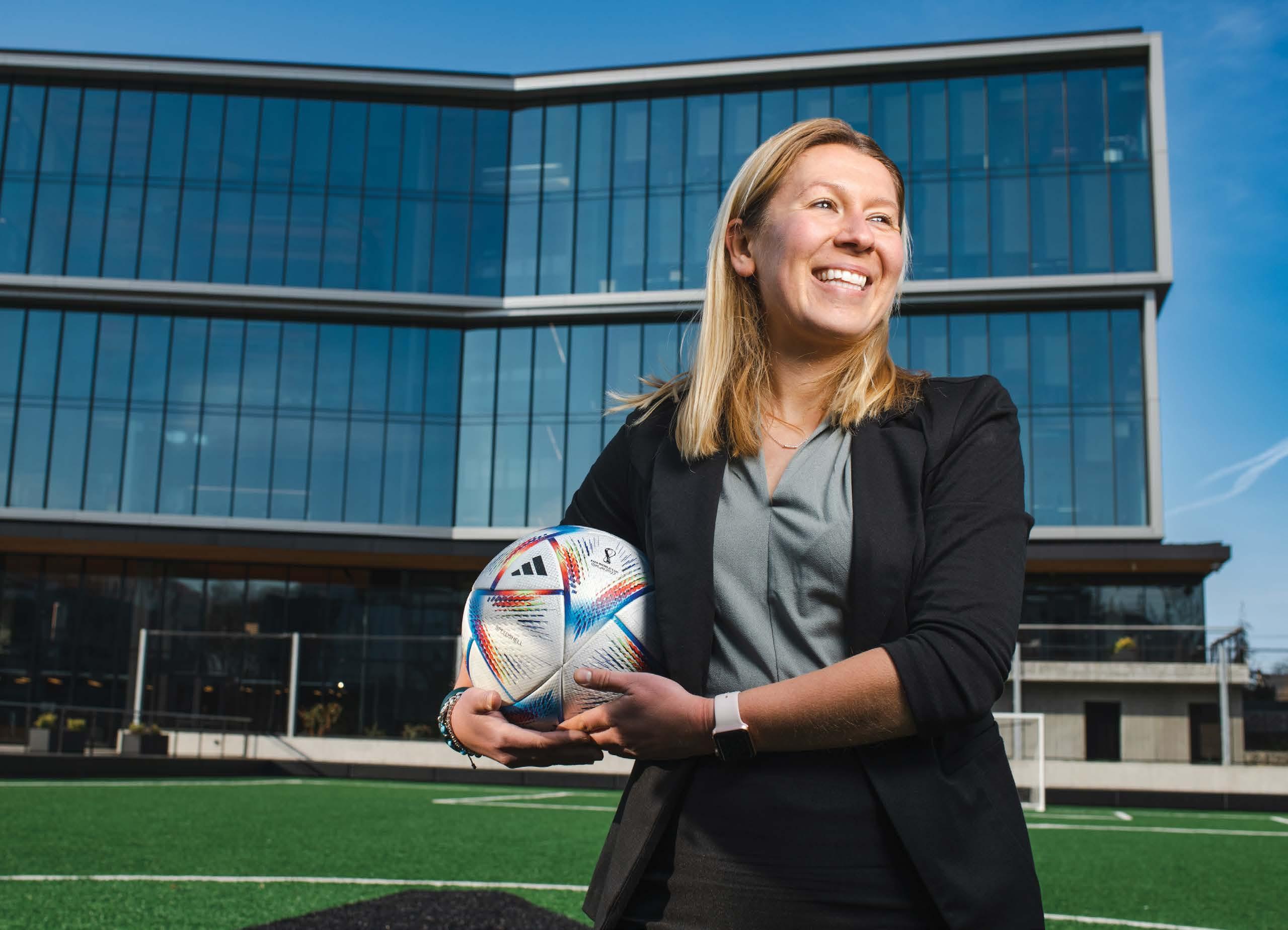
Merchandising 101: At Adidas, Johnson oversees operations like marketing, forecasting, and sales that are integral to launching new products. Using the analogy of a bike wheel, Johnson says that her role—the hub—works with cross-functional partners—the spokes— to connect consumers and products.
Blazing new trails: Johnson acknowledges the challenges of being a female in the sports industry, but uses her leadership skills to create pathways for others. “Even though I’m not a pro athlete, I can be that inspiration for younger females,” Johnson says. “We need more females who can lead in this industry.”
Leaving a legacy: When she was an undergraduate student, Johnson founded the Kelly Johnson Foundation to provide extracurricular and academic support to Wisconsin high school students. It has since expanded nationwide, and has awarded 17 scholarships and provided sports equipment to four high school teams.
Impact of a WSB degree: Johnson says her WSB education helped her develop a business-focused, open-minded perspective, enabling her to be creative and think on her feet. It also gave her the insight to integrate her lifelong passion for tennis into a finance position at Wilson.
Hitting the ground running…literally: An avid runner, Johnson hopes to run a race in all 50 states—and with 29 completed already, she’s more than halfway there!
Talking shop: Johnson hosts a podcast called The Daily Grind where she talks to entrepreneurs, business owners, and CEOs about goal achievement. It’s an opportune way to keep learning, she says. “Soak up as much information as possible from experts in their respective industries. Because one, that’s where they live and breathe, and two, that’s their daily grind.”
Location: New York

Previous jobs: Private equity associate, Madison Dearborn Partners, LLC; investment banking analyst, Greenhill & Co.


Why he’s among the 8 to Watch: Schlidt is on a mission to find the next breakthrough antidepressant. Driven by his own struggles with mental health, Schlidt co-founded Palo Santo in 2020, a venture capital fund focused on funding psychedelic therapies to treat conditions like depression, anxiety, PTSD, and addiction. He was named to the 2023 Forbes “30 Under 30” list in the venture capital category.
Business and biology: Schlidt’s lifelong interest in business led him to pursue finance at WSB, but growing up, he also felt a strong pull towards biology. After being diagnosed with and treated for depression in middle school, he developed an additional interest in psychology and psychiatry.

Pivoting to psychedelics: While working for a private equity firm after graduation, Schlidt began hearing about emerging data regarding the potential of psychedelics to treat mental health disorders. Impressed by the science, he began talking with psychedelic industry leaders and researchers, and the idea for
Palo Santo was born. However, it wasn’t until COVID-19 hit—and put mental health in the national spotlight—that Schlidt knew the time was right to launch the fund.
A new approach: The introduction of drugs like Prozac in the 1980s revolutionized how conditions like depression were treated, but since then, Schlidt says there’s been little innovation in the field. Psychedelic therapies, he adds, have the potential to improve on these drugs by treating the root causes of these conditions and not just the symptoms.
Impact of a WSB degree: “Being able to run case studies and do interesting projects in my advanced classes has had direct applicability in my career.”
Putting in the work: While psychedelics have improved Schlidt’s life, he says any medication is only one piece of a bigger mental health puzzle. “I think the biggest misconception is you just take a pill and everything’s better. I’ve done a lot of personal work over the years, and I’m proud of where I am today.” ◀
Izzy Fawcett is getting to be quite the global citizen these days.
The WSB junior from Wheaton, Illinois, spent her Spring 2023 semester studying abroad in Rome and also traveled to Berlin over spring break in 2022 for a faculty-led trek as part of a supply chain management course. Even though she “loves Madison more than anyone,” Fawcett knew getting off campus to participate in international learning would build new skills and push her out of her comfort zone.
“I think it’s important to understand business on a global level, but there are also so many personal benefits that people gain by going abroad,” she says. “I’ve definitely learned to be more vulnerable and open-minded.”
Stories like Fawcett’s are common at the Wisconsin School of Business. That’s because 40% of WSB undergraduate students study abroad—well above the national average— and all signs point to increased interest, especially coming out of the COVID-19 pandemic.
“I call it the ‘getting out of my parents’ basement’ energy,” says Kallan Picha, director of global programs and partnerships at WSB. “Students really want to explore and experience the world. We’re trying to match that energy and build programming students want to take advantage of.”
Nicholas Santas (MA ’24) Buenos Aires, Argentina
While the traditional one-semester study abroad program has long been a staple of colleges and universities, WSB is taking global learning to the next level with the development of new, shorter-term international treks for both undergraduate and graduate students, as well as establishing new exchange partnerships with universities across the globe to bring more visiting international students to Madison.
It’s all part of the school’s plan to help students develop
a global mindset—one that will prepare them for careers in today’s business environment.
“The world is more interconnected than ever, and we want to create students who are not only globally minded, but are good global citizens,” says Picha. “To do that, we’re really broadening the menu of options so that students have a whole portfolio of programs to choose from that fit with their budgets, their timing, and their interests.”
Through global learning, students build problem-solving skills, learn resiliency and flexibility, and increase their cultural awareness. The benefits also manifest in more tangible ways; Picha notes that students who return from studying abroad have higher GPAs, stronger job prospects, and increased earning potential (including, on average, a 25% higher starting salary).
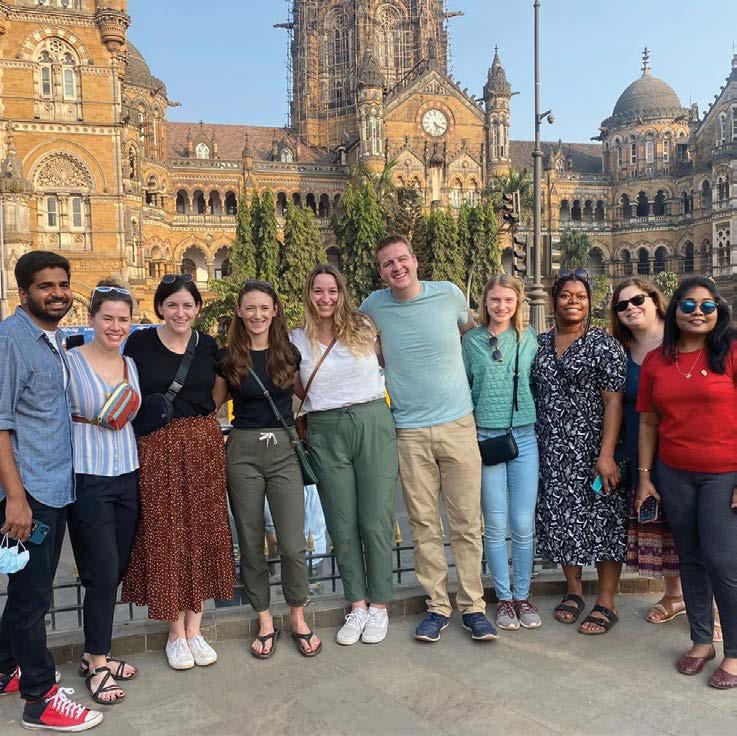
Whether students are going for a full semester or a 10day trek, Picha’s team is committed to maximizing the time
with meaningful experiences. “Students are earning credits, they’re getting grades, they’re doing assignments,” she says. “Meanwhile, we’re arranging engagements with local companies and cultural immersions, so students are learning a lot and working really hard.”
Thanks to scholarships and philanthropic support through initiatives like Day of the Badger, more students than ever now have access to resources to offset the costs associated with international programs.
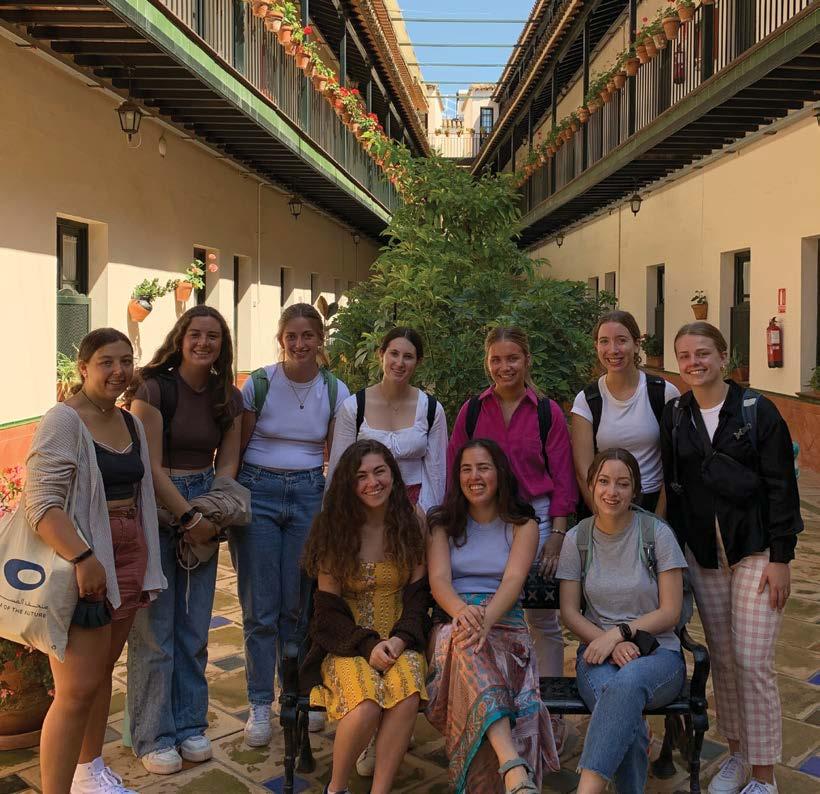

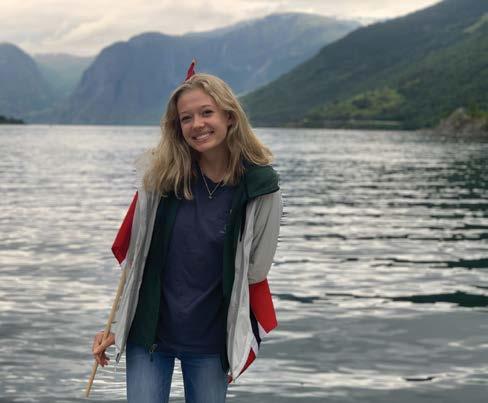
That’s something that resonates with Fawcett, who hopes more students can have opportunities just like the ones she’s had.
“I do think everyone deserves and should have a global experience,” she says. “Being open to learning a different language and customs and the value of diversity in business is really important. And as college students, this is the time to do it.” ◀
Izzy Fawcett (BBA ’24) Rome, Italy
Emma De Bruin (BBA ’25) Oslo, Norway
Mumbai, India
Seville, Spain
“We want to create students who are not only globally minded, but are good global citizens.”
KALLAN PICHA DIRECTOR OF GLOBAL PROGRAMS AND PARTNERSHIPS
Audley Glenn Lemmenes (BBA ’59) is the president of Faith Based Education, Inc., a Wisconsinbased nonprofit that he helped found in 2015. Previously, he spent time in a corporate management training program and also held a financial administration role at Trinity Christian College in Palos Heights, Illinois. That began a 35-year career in senior-level administration, including stints at the Museum of Science and Industry in Chicago and Alverno College in Milwaukee.
Richard E. Markos (BBA ’64, MS ’67) is upgrading and updating Markos Wholesale Apparel, which has been in business since 1901. He is improving the business’ merchandise selection, shipping services, and customer service, but will keep the business a “going concern” by focusing on two things he and his family are known for: quality merchandise and quality service.
Pete Barile (MBA ’66) turned 80 last year and continues to run his two factories that manufacture seating for the hospitality market. Due to its smaller size, the company can change direction while having a cup of coffee, thus addressing new market requirements long before its larger, slower-moving competitors. Barile is happy to report that business is fantastic.
Steve Cain (BBA ’68) will soon be celebrating his eighth anniversary
of managing the Midwest office of Fairfield Capital Group, LLC.

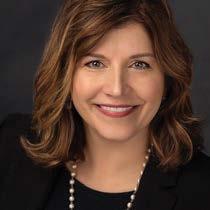




are still providing some services to a few clients, but plan to spend much more time at their vacation home on Hilton Head Island in South Carolina.
and he sponsored the launch of Baird Scholars in 2021. Schroeder is proud that these resources will support the next generation of professionals.
More Class Notes are featured in the digital issue at business.wisc.edu/ update/spring-2023
Neil Kosterman (BBA ’72) provided editing and website support for the book When Heads Come Together, which was written by his business partner of 15 years and discusses the prevention of traumatic brain injuries. In addition, Kosterman also manages their three businesses.
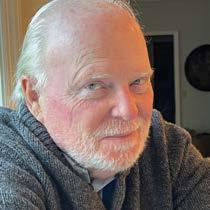
David Nusbaum (BBA ’72) and Julie (Norman) Nusbaum celebrated their 50th wedding anniversary last June “by the light of the silvery moon”.
William Rauwerdink (BBA ’72) was elected chair of Michigan’s 11th Congressional District at the state’s Republican Party convention in February 2023. As part of this role, he will also serve on the party’s state committee.
Carol Stotlar (BA ’73, MS ’78) and her husband sold their accounting firm, Stotlar & Stotlar SC, after 37 years in business. The two certified public accountants
Michael Connelly (BBA ’75, MA ’76) was the chief executive officer of Mercy Health, one of the nation’s largest health systems, from 1994 to 2017. He’s the author of the new book The Journey’s End: An Investigation of Death and Dying in Modern America
Doug Griese (BBA ’75) was elected to the Green Lake and Duck Lake Association board of directors for a three-year term in 2022. In February 2023, he was also elected to the board of directors of the Fishtown Preservation Society in Leland, Michigan.
David Nemschoff (BBA ’76) retired in 2019 after a successful career in banking and finance, which led him to the role of chief financial officer. He now teaches history, military history, and diplomacy at Long Island University. His book, Israel at the Brink: The Yom Kippur War, was published in 2022.
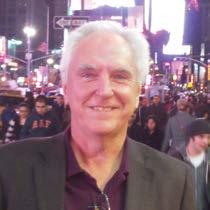
Mike Schroeder (BBA ’79) was recently named chairman of private wealth management at Baird. He has served the firm for 37 years, and his passion for creating opportunities for students to explore careers in the industry continues to grow. Through Baird, he was a founding partner of the wealth management and financial planning program at UW–Madison,
Roy Fischer (BBA ’87) has been successfully navigating high-tech sales for the past 26 years!

Ken Strmiska (BM ’88, MA ’90) founded Anovia Health with four other individuals in 2021. Anovia partners with businesses to deliver a better primary care benefit and to provide the potential for significant downstream cost savings.
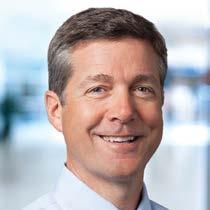
Scott K. Petersen (BBA ’89) recently completed a 40-hour training course as part of becoming a circuit mediator certified by the Florida Supreme Court. He is board certified in condominium and planned development law, as well as business litigation by the Florida Bar.
Amy Kluz Janke (BBA ’90) recently accepted the role of chief financial officer at Wausau Supply Company, a manufacturing and distribution organization specializing in high-end building materials with 19 locations spanning the United States. She offers many thanks to UW–Madison for providing the excellent education that affords her opportunities such as this one!


Michael Murray (BBA ’90) is a senior vice president and senior investment consultant for the Murray Thomson Group of Baird. Murray and his business partner, Gregory Thomson (BBA ’91), advise clients on wealth management issues and manage their investment portfolios.
J Evan Smestad (BS ’91, MBA ’04) and his wife, Jodi Samuels (PhD ’01), celebrated their 20th wedding anniversary this year, which included a Polar Plunge in Vancouver, British Columbia (brrr!). They were married in the Wisconsin State Capitol after Smestad’s first semester at the Wisconsin School of Business. Samuels was his GMAT instructor who helped him get into the Grainger Center for Supply Chain Management. They returned to Madison over Thanksgiving to watch the Battle for the Axe from the comfort of the W Club. As a thanks to UW–Madison, they are endowing a scholarship to WSB. On, Wisconsin!

Heather La Freniere (BBA ’92) co-founded the multi-strategy investment firm LAGO Asset
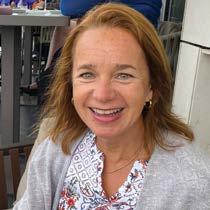
Management in 2019 after more than 25 years working at larger financial institutions. Its series— LAGO Innovation Fund I, II, and III—provides senior debt to emerging, high-growth companies in the technology and consumer sectors. After three years, the firm now has 41 portfolio companies and 10 employees.
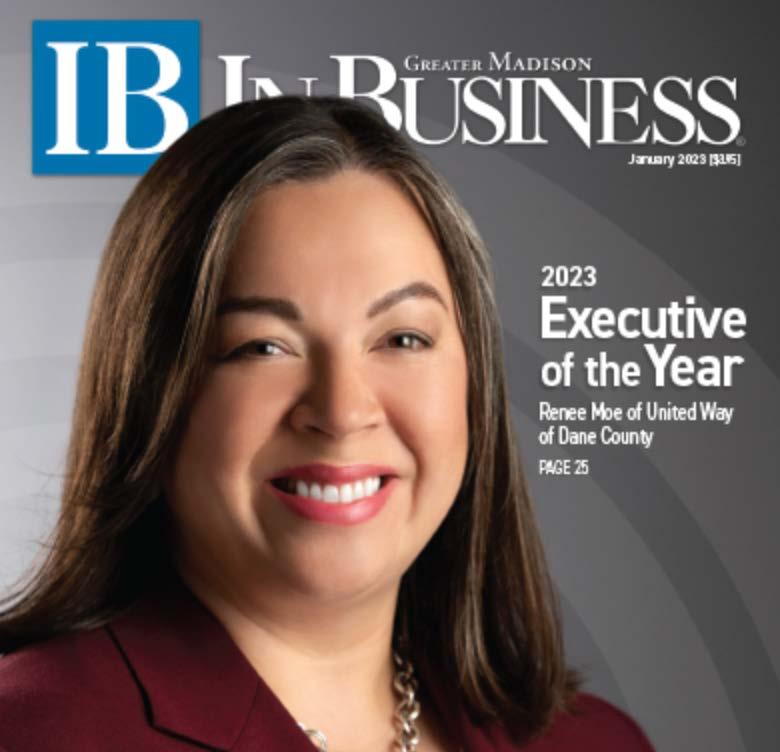
Michael LaCourLittle (MS ’95, PhD ’96) has retired from Fannie Mae where he was senior director of economics in the Economic and Strategic Research Group. Previously, he was chair of the finance department at California State University, Fullerton, where he continues as a professor emeritus. An expert in real estate finance and related topics, LaCour-Little is available for consulting assignments including expert witness work.
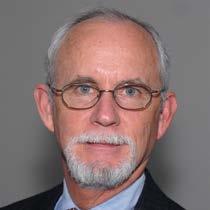
Jen Levenhagen (BBA ’95) was recently promoted to regional vice president, professional services sales leader – high tech at Salesforce.
Julie Fry (MA ’97) appeared on Morgan Stanley’s Times Square billboard in New York City in recognition of completing the Morgan Stanley Inclusive Ventures Lab program. Fry is also one of the founders of Gentreo, an awardwinning online estate planning platform that makes estate planning affordable and accessible to all.
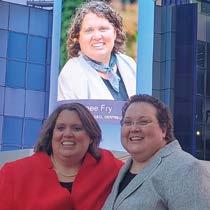
Jeremy Moungey (BS ’97, MBA ’02) was promoted to lead the North
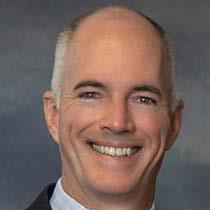
American Workday Delivery Practice for Alight Solutions. Moungey will bring the same tenacity and energy that he had as a four-year member of the University of Wisconsin Marching Band!
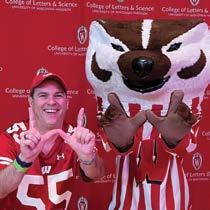
she launched a new corporate wellness program through her company. The goal of this program is to elevate organizational employee health, wellness, happiness, engagement, productivity, performance, work-life balance, and retention through ongoing education, group coaching, online courses, classes, special discounts, reporting, and more.
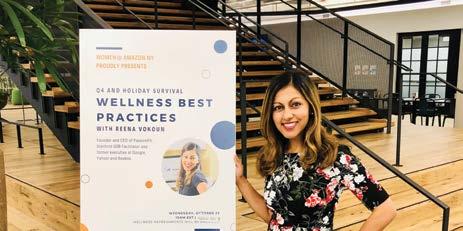
Continued on page 26
Reena Vokoun (BBA ’98) is the founder and chief executive officer of Passion Fit. Recently,







“Congratulations to this year’s Executive of the Year: Renee Moe, president and CEO of United Way of Dane County!”
(BA ’99, MBA ’08)Photo by Shawn Harper
Scott Finkelmeyer (BBA ’99) relocated from Scottsdale, Arizona, to Carmel, Indiana, in July 2022 with his wife, Keiya Bell-Finkelmeyer (BS ’96), and their 5-year-old dog, Bascom. Finkelmeyer is now the enterprise sales director for Coretechs.ai, a leading innovator in artificial intelligence software.


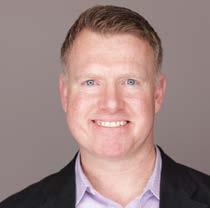
Clint Walkner (BBA ’99) is one of the founding and managing partners of Walkner Condon Financial Advisors, which was rated #1 for Wisconsin in CityWire’s “50 Growers Across America” for registered investment advisor firms in 2021.

Brad Feldman (BBA ’03) is the senior managing partner at Interra Realty. In 2022, he had a record year in multi-family sales in Chicago, having sold over 25 buildings (totaling close to 600 units) with a total consideration of over $140 million.
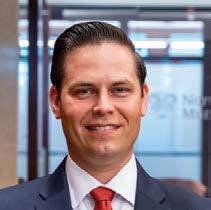
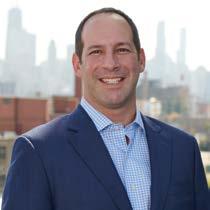
Joseph Dahari (BBA ’04) has taken the role of vice president of sales and business development at Bits of Stock. Previously, he was the head of sales at Fetch Rewards and the chief revenue officer at GrocerKey. Bits of Stock is the third venture capital-backed startup in which Dahari has held an executive role.
Robert Thelen (BBA ’06) is the chief executive officer and cofounder of Rownd, a technology startup company that raised $2.2 million in seed funding to help companies radically improve their user onboarding rates.

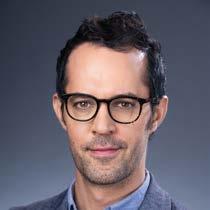
Brandon Goetzman (BBA ’08) was promoted to managing principal and co-head of the Equity Group at Blue Vista Capital Management in Chicago. He focuses on the firm’s commercial real estate equity investment activities with a concentration on middle-market equity acquisition and development opportunities.
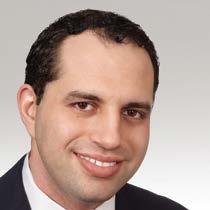
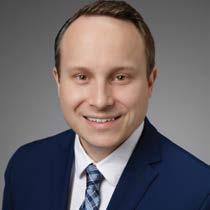
Brandon P. Reiner (BBA ’10) has been elevated to partner in the construction and design law practice at Tannenbaum Helpern Syracuse & Hirschtritt LLP. Reiner’s variety of experience throughout the lifecycle of construction projects and his understanding of the daily business operations of building owners make him a trusted advisor to clients. Reiner was also named a “rising star” by New York Super Lawyers from 2017–2022, and has been included in Best Lawyers: Ones to Watch in America since 2021.
Bryan Brunken (BS ’12, MBA ’20) has been working at Heckmann Financial in the planning department and was promoted to a lead advisor position.
won the Chancellor’s Entrepreneurial Achievement Award in April 2023, which recognizes UW–Madison innovators and alumni who further the Wisconsin Idea through outstanding accomplishments in entrepreneurship. Cofounders of Fetch Rewards, Kennedy is the senior vice president of operations and Schroll is the chief executive officer.
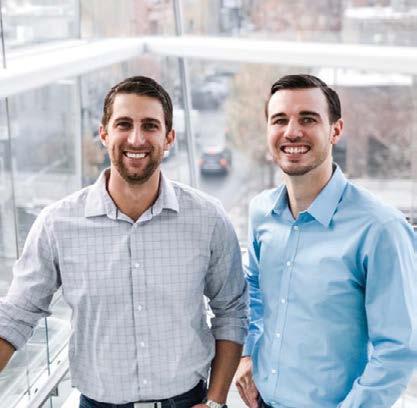





Kendra Armstrong McAdams (MBA ’12) and her husband, Scott, welcomed Davis Scott McAdams on September 29, 2022. He joins big sister, Sloan (2).

Jennifer Hoege (MBA ’14) is proud to announce that she completed her training and is now a certified professional co-active coach.

Sarah Mahon (MBA ’15) has been appointed to the role of vice president, Technical Practice Network global director for AECOM, a $13.5 billion global design firm ranked #260 by Fortune 500. AECOM’s Technical Practice Network serves as a community of practice by connecting its technical people to one another and to resources they need for project resourcing and delivery to clients.
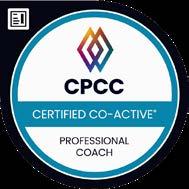
received the Thomas A. Costello Memorial Alumni Award in November 2022 for his efforts in student mentorship and recruitment. This award, which commemorates the legacy
of the late Tommy Costello (BBA ’19), recognizes a member of the Badgers in Finance alumni network who goes above and beyond to help others.
During Thompson’s career at Guggenheim Partners, he hosted Badger students on company visits and created a pipeline to hire students for internships and
full-time employment. He is a mentor to UW–Madison students and has returned to campus to speak with students about cryptocurrency. Thompson is currently the head of growth and capital markets at Maple Finance, an institutional debt capital markets startup.
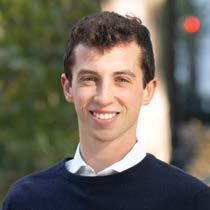
Robert Broome (BBA ’16) started his own snack bar brand, Mooski, which makes chilled oat bars dipped in chocolate. As Broome began building a team, he brought on Chelsea Sherman (BBA ’15) as a part owner and leader of finance and supply chain.
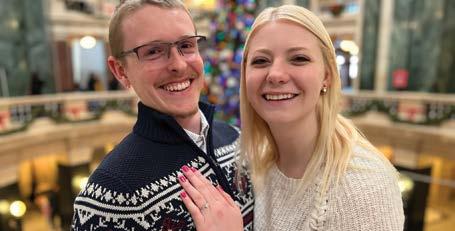

Liz Christenbury (MBA ’16) has worked in consulting and software sales at Deloitte and Salesforce, respectively, since her graduation from WSB. In September 2022, Christenbury launched GymNet Fitness, an online marketplace which connects people to nearby workout spaces.
Amy Walsh (BBA ’16) took a new role as indirect sourcing business lead with General Mills in October 2022. She is excited to join the General Mills organization!
Jacob Dinetz (BBA ’18) joined the startup brand Blank Street Coffee as
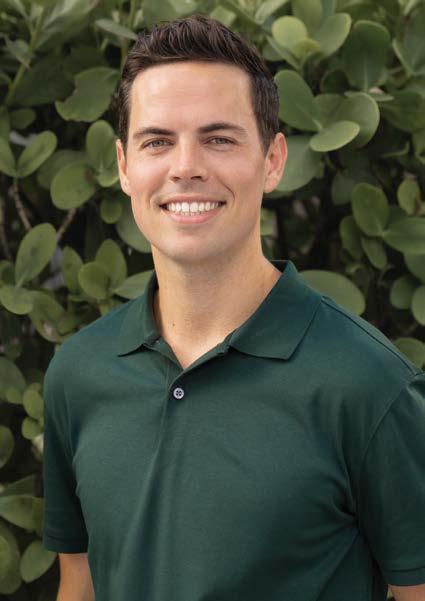





its first real estate hire at the end of 2021. Since then, the company has raised its Series A, opened over 70 locations, and spanned across four global markets. It is now the largest specialty coffee shop on the East Coast by location count. In December 2022, Dinetz was featured on Commercial Observer’s Top Young Professionals list.

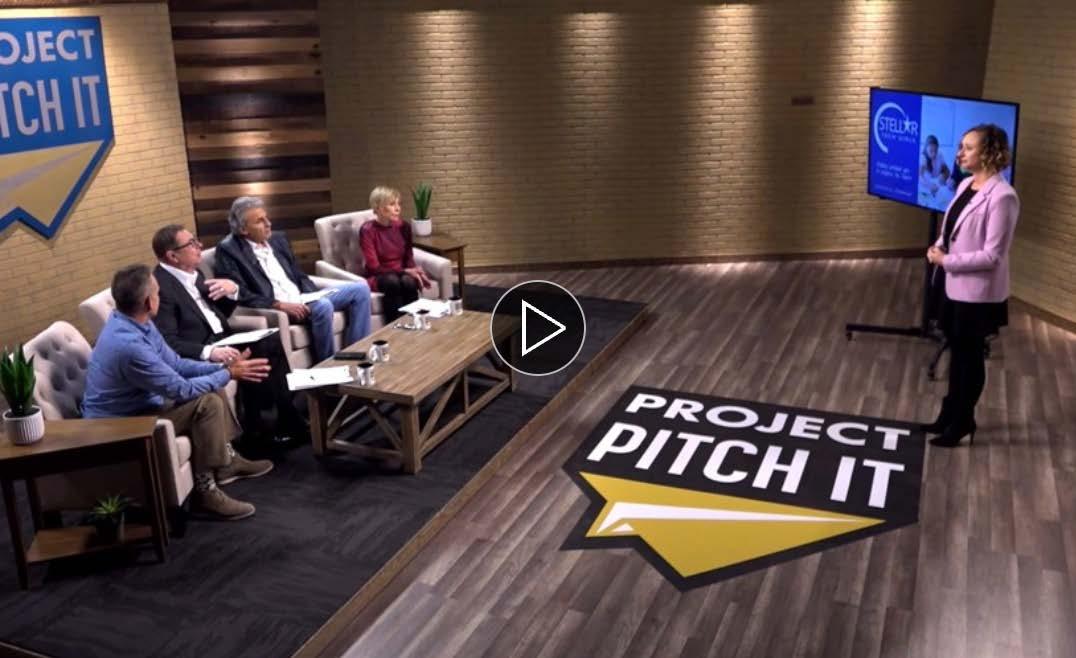
Paul Boyer (BBA ’19) celebrated his one-year anniversary as a Windows and application system administrator for the Wisconsin School of Business in December 2022. This position is the materialization of his dream job, and he looks forward to the new duties that emerge each day. In addition, he made the life-changing decision to propose to his best friend, Haley Tollison (BA ’20). Boyer and Tollison are engaged to be married in October 2024.
“Breaking news! Stellar Tech Girls is on a TV near you! Tune in to watch me pitch to a team of Wisconsin moguls on
‘Project Pitch It’ Episode 1, Season 7! The show aired all over Wisconsin in March and April 2023.”
MARINA BLOOMER (MBA ’22)
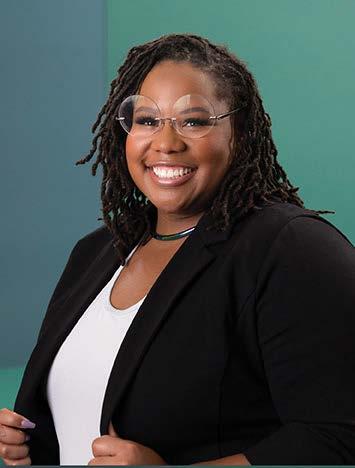
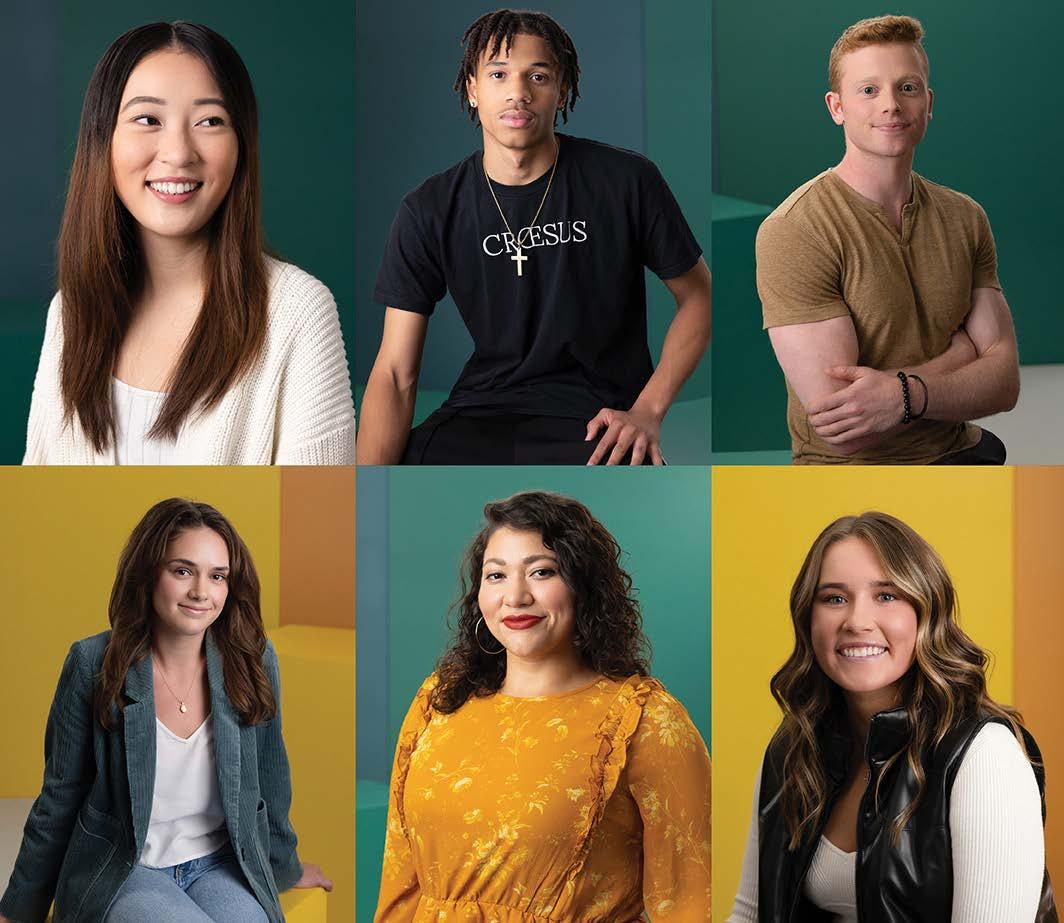
With a little help from more than 20 business undergraduate and graduate students, the Wisconsin School of Business launched a new phase of its Trusted to Lead brand campaign in 2023. In this behind-the-scenes look, meet some of the emerging leaders who are redefining the possibilities in business. Read more at business.wisc.edu/ next-generation-leaders. ◀
In a series of videos, students like Avi Gomez (MBA ’23) share their stories and aspirations, including creating positive change through HR.
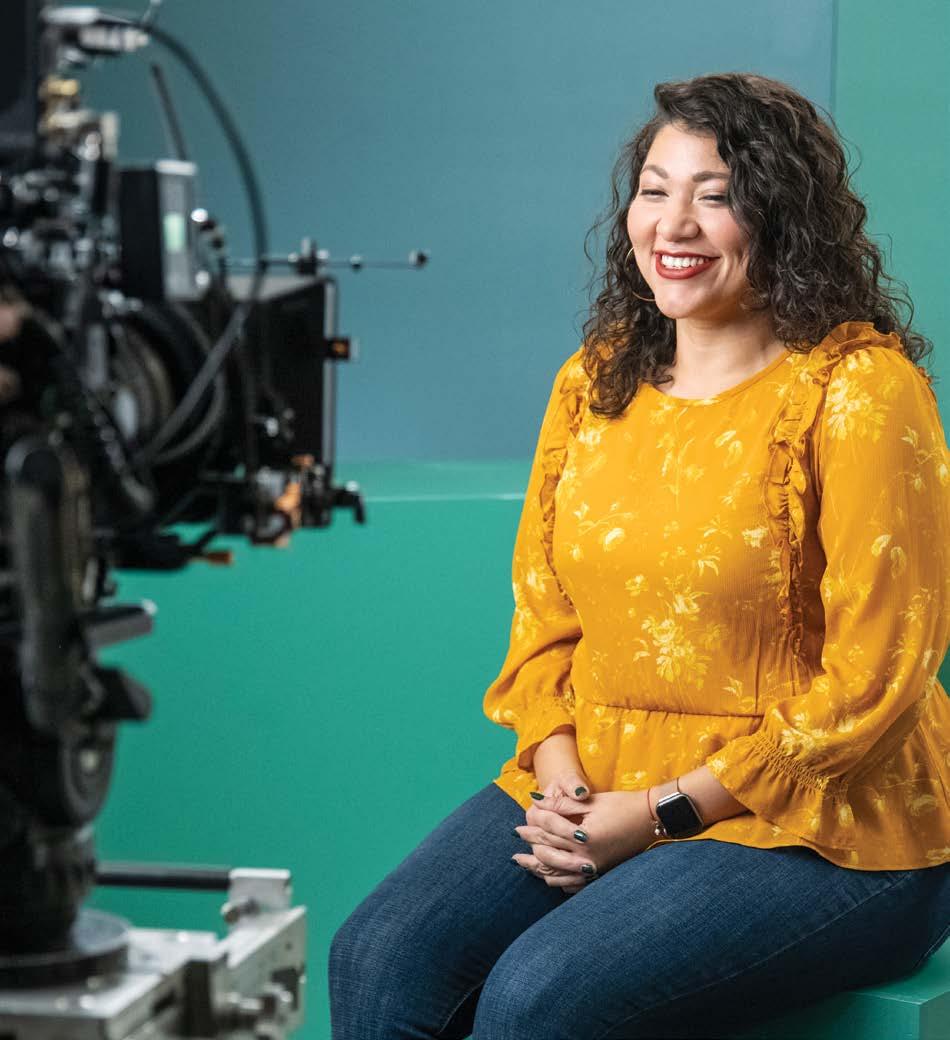
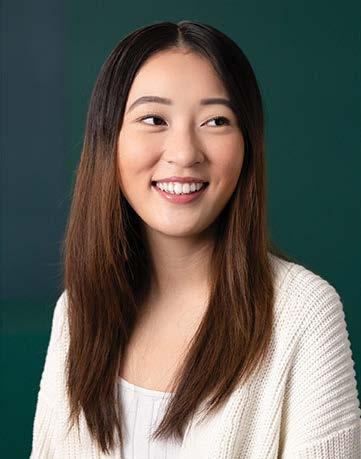
start his own development or private equity firm,


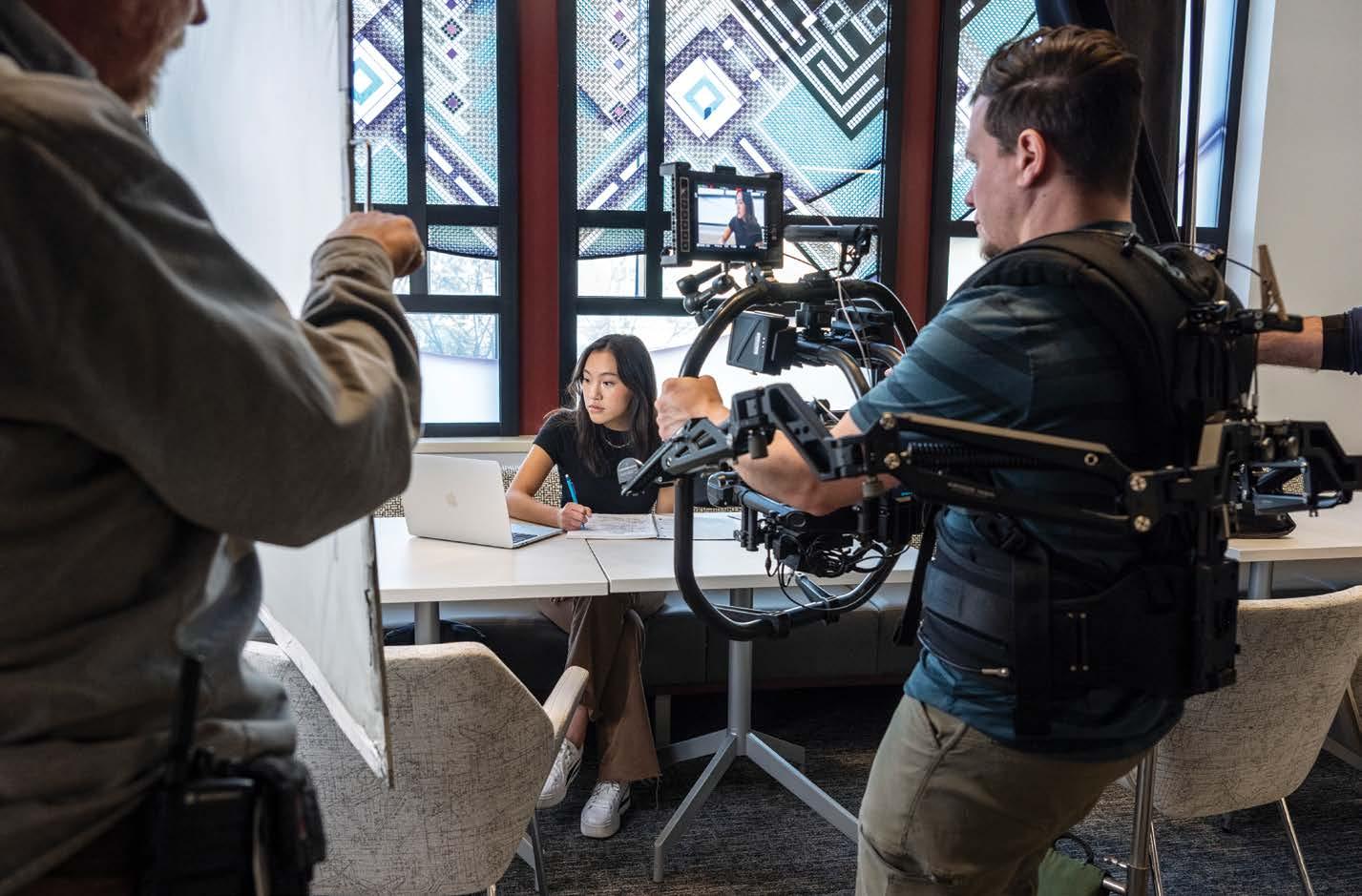
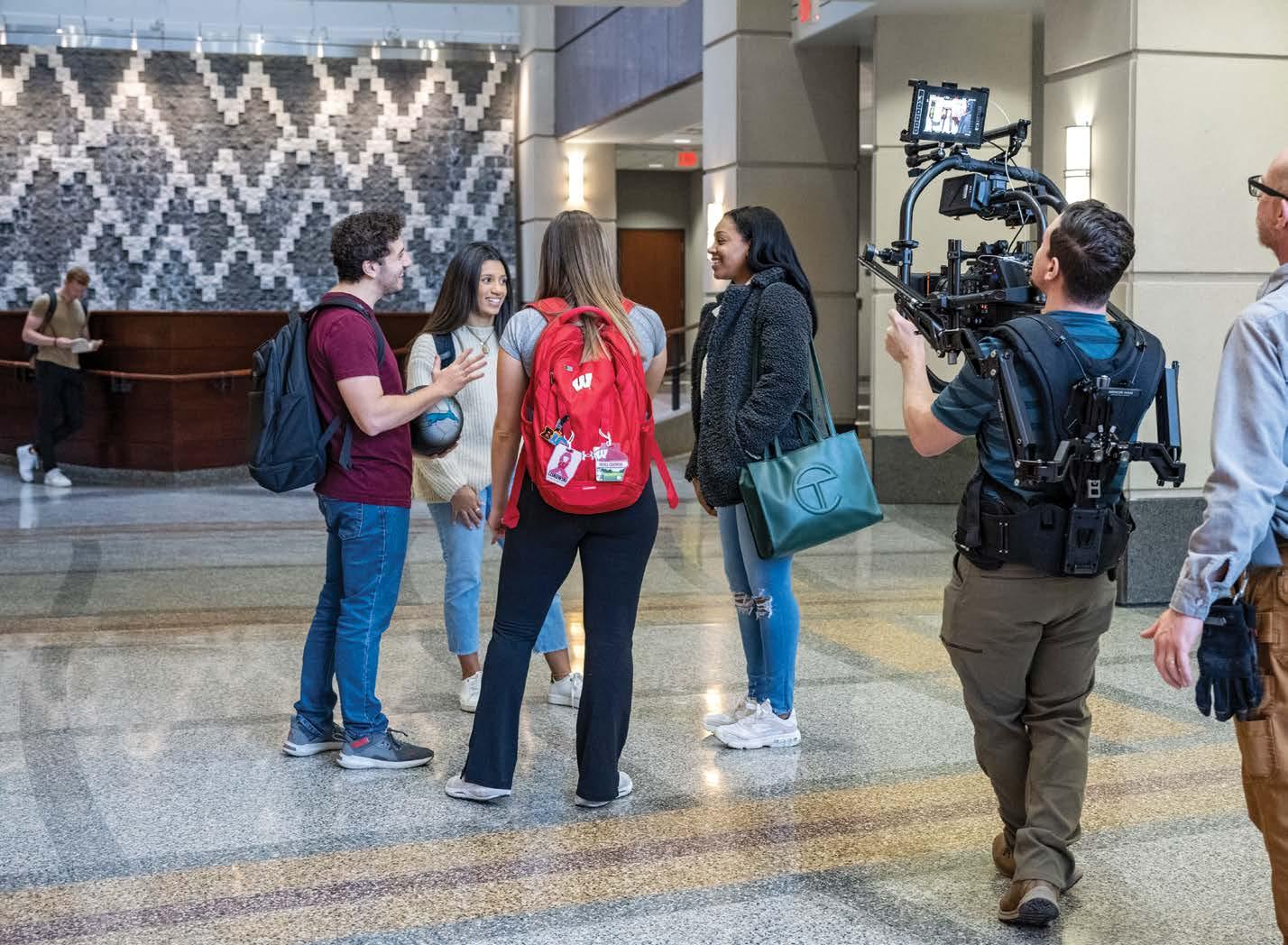
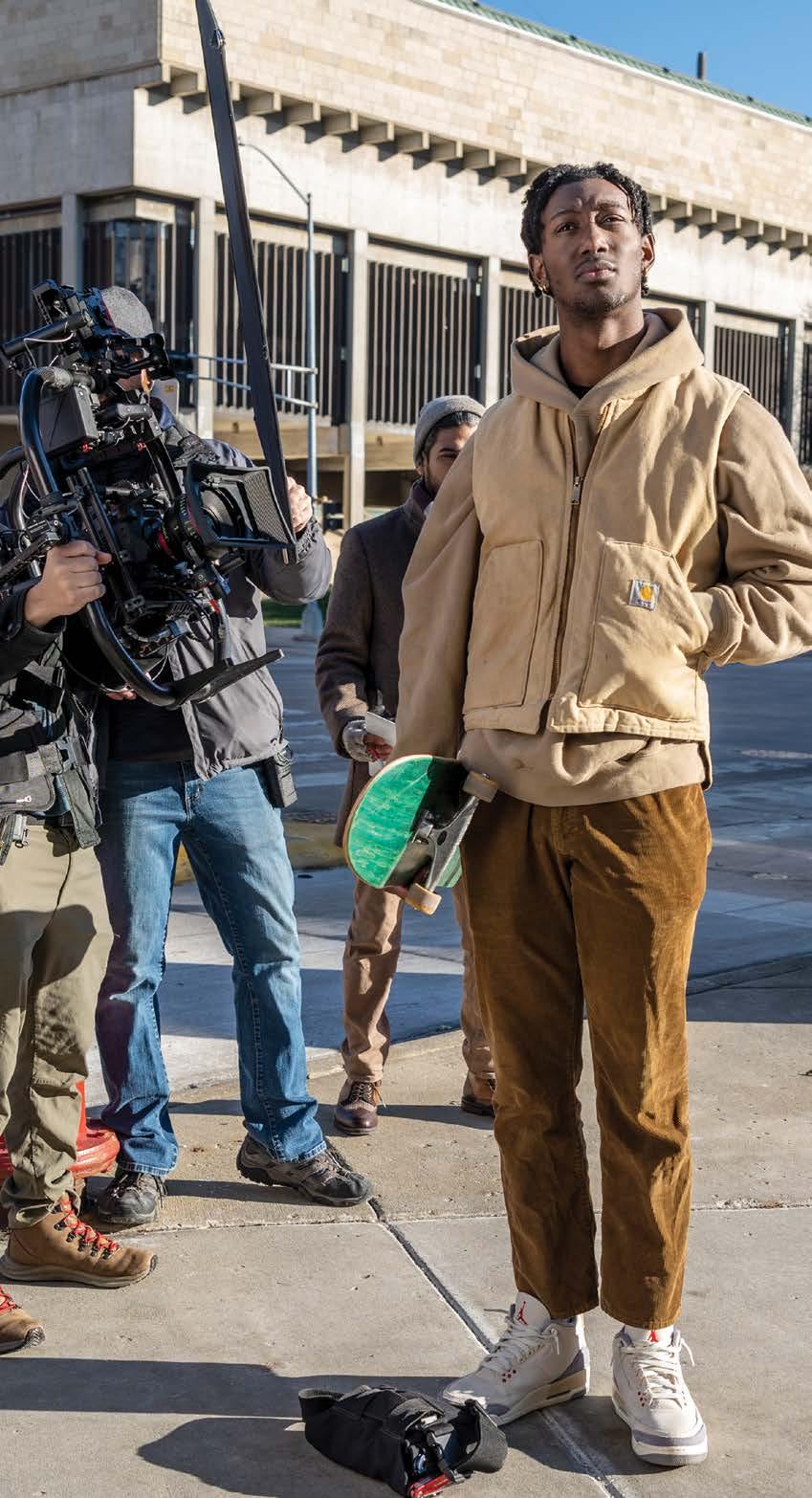
“Understanding what’s going on in the world and how different events all connect is an overarching passion of mine.”
CHARLIE FORBES (BBA ’23)Kenzi Jones (BBA ’22) tells the camera crew about her dreams of becoming a chief marketing officer. Ayo Kolawole (BBA ’25), who hopes to shows off his skills on four wheels for a campaign video. Videographers capture footage of students in Grainger Hall. Michelle Yang (BBA ’25) is filmed in WSB’s Learning Commons. She cares deeply about the ethical use of technology.

